訪日外国人向け保険・インバウンド保険

TOKIO OMOTENASHI POLICY | Tokio Marine & Nichido
Overseas travel insurance for foreigners visiting japan (even if you are a japanese national returning to japan temporarily) for up to 31 days., = insurance for visiting japan =.
Chinese(Simplified) | Chinese(Traditional语言) | 한국 | 日本語
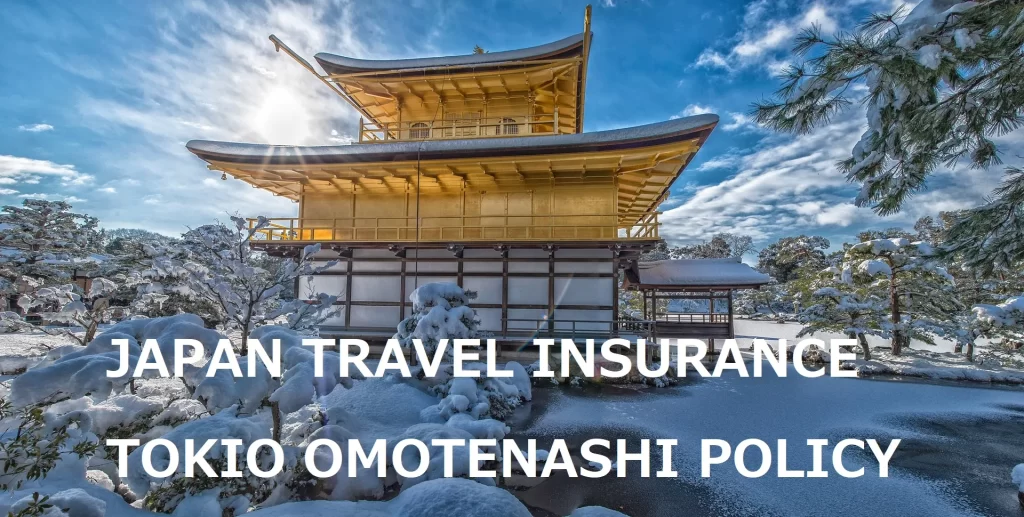
What is TOKIO OMOTENASHI POLICY?
TOKIO OMOTENASHI POLICY is an overseas insurance policy in case of sudden illness or injury for foreigners visiting Japan and or Japanese national’s returning to Japan temporarily for up to 31 days that can be purchased online. (Insurance can be purchased online).
If you need to see a doctor or hospital care is necessary the insurance company should be contacted and your medical expenses will be paid directly from the insurance company to your caregiver. (Cashless)
TOKIO OMOTENASHI POLICY is easy and reasonably priced because it is specialized for illness and injury, the premium is less expensive than general overseas travel insurance. (Easy and Reasonable). In addition by using the dedicated application, you will be able to use support functions for certain troubles and natural disasters that might occur during your stay in Japan.
( You can easily contact the insurance company via the app)
Click for Apprication ↓↓↓↓↓↓↓↓↓

For example, if something like this happens…
Sudden illness… Prepare for sudden illness during your stay in Japan.
Unlike your everyday life, the environment and food changes when you travel may or may not have an effect on your health.
Even if you are a foreign national that is accustomed to eating Japanese food and enjoy eating other local dishes or unusual foods that you have never seen before. It could be a difference in temperature or many other things that may affect your health.
We are no longer in a era where we can say, “That will never happen to me so I’m fine”
We are also prepared for the new type of Coronavirus (Covid-19)

Unexpected injury… You were supposed to be enjoying yourself…

Covers injuries that occur during sports such as skiing
Traveling is a fun time, but injuries that occur during such times are common occurrences.
But, you also need to be careful about injuries that may occur during sports such as skiing.
Injuries that occur during these times are normal, but you should also be careful about injuries that occur during sports such as skiing.
Injuries may also occur during normal, everyday life. We provide coverage for injuries caused by sudden, accidental, and outpatient accidents.
Expensive medical bills… No way Why me …
In some cases, hospitals won’t accept medical examinations…
Foreign travelers and others who do not have health insurance. (100% self-payment).
There are cases where you will be charged an outrageous amount of money… It is very common.
Credit cards are not accepted at hospitals… you have to pay in cash.
Even medium-sized hospitals such as municipal hospitals and city hospitals do not accept credit card payments.
Also smaller clinics are known not to accept credit card payments.
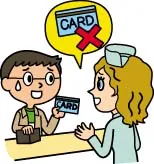
The insurance company will pay directly to the hospital or pharmacy
By contacting us before you go to the hospital, we contact the hospital first. We will contact the hospital before you go to the hospital so that you can concentrate on your treatment.
Please be aware that foreign visitors who fail to pay their medical expenses may be denied entry into Japan in the future. Japan National Tourism Organization (JNTO)
Non-payment of medical treatment by foreign travelers in Japan has become a problem, and the government has taken such measures.
Of course, Japanese nationals are no exception.

Incidental Services
The following services are also included in the package…

Lost or stolen passport or credit card…
Traveling is always fraught with problems, but there are some things you should never lose. (Available in a variety of languages)
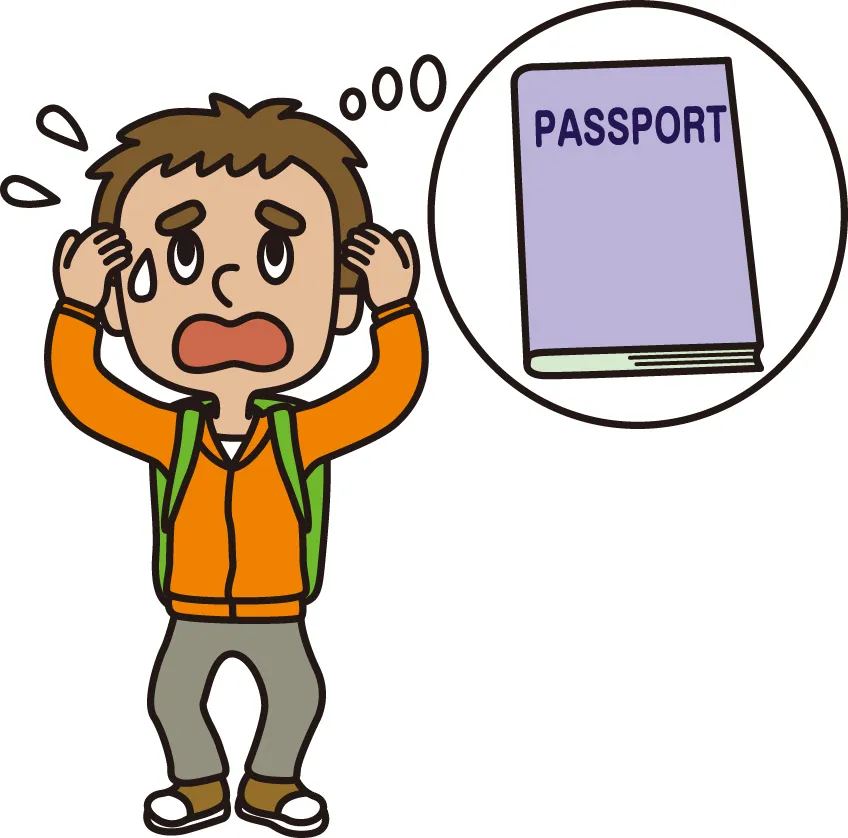
Internet connection lost…
We provide information on useful apps for using public Wi-Fi provided at tourist spots. We provide information on useful applications (with free Wi-Fi functionality for an unlimited period of time)
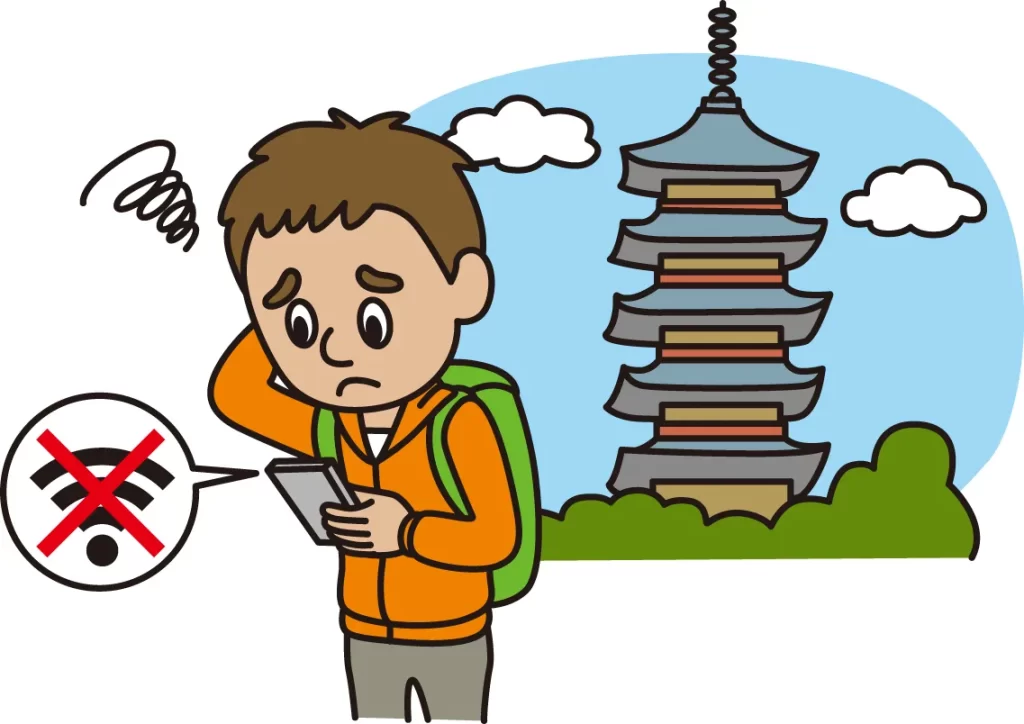
Insurance Amounts
Coverage item: medical treatment and transportation expense coverage (for foreign visitors to japan).
Covers medical treatment expenses for sudden illness or injury.
If you contact the insurance company before going to the hospital, the insurance company will pay the treatment expenses directly to the hospital. (To contact the insurance company, you need to install the application.)
10,000,000 yen (including covid-19 infection)
Rest assured that 100% of your expenses for medical treatment, medicine, hospitalization, surgery, and medical transportation to your home country will be covered up to 10 million yen.
Insurance Premiums
Insurance premiums vary depending on the period of insurance.
Please check
There are some important points to note.
About the insurance period
The insurance period is from the day after the date of application or the day of entry into Japan , whichever is later, to the day of completion of departure procedures from Japan.
Example: ① If you apply after entering Japan and apply today, set tomorrow as the insurance start date.
Example: ②Even if someone in Japan applies, depending on the country of departure, someone arriving tomorrow or later may not be able to apply.
(Please apply after entering Japan)
If you are staying in Japan for more than 32 days. (You need someone living in Japan. You can not buy Insurance by yourself) >> Click Here <<
What if it happens outside of Japan?
This insurance policy covers medical and pharmaceutical costs arising from injuries or illnesses occurring in Japan, as well as the cost of repatriation of the patient to his/her home country.
(Accidents outside of Japan are not covered.)
The required documents
Since enrollment is completed online, there are no documents required.
However, please be aware that you may not be able to use the insurance if you make a false declaration.
Common example: An application was submitted more than 5 days after entry to Japan, but an error occurred, so an incorrect date of entry was entered and insurance was purchased. 【The insurance cannot be used】
Can I apply from abroad?
The application site can only be accessed from within Japan, Hong Kong, China, or Korea.
How can I confirm the operation of the screen before I leave Japan? >> Click Here <<
↓↓↓ Click the banner to apply ↓↓↓↓

<Recommended Environment>
PC Microsoft Windows 7, 8, 8.1: Internet explorer 11.0 or higher, latest version of chrome Microsoft Windows 10 : Internet explorer 11.0 or higher, Microsoft Edge , the latest version of chrome
Smartphones and tablets Android 4.4 or later: Latest version of chrome iOS 8.4 or later: Latest version of safari
Please note that there are some cases where Firefox cannot be used.
For those who cannot proceed to the TOKIO OMOTENASHI POLICY application page >> Check this page <<
If you have any questions, please contact us by e-mail. mail: [email protected]
Underwriting Insurer Tokio Marine & Nichido Fire Insurance Co.
Handling agency OFFICE21 Co., Ltd.

This homepage provides an overview of the insurance policy. Please be sure to read the “Explanation of Important Matters” carefully before you make a contract. If you have any questions, please contact our agent.
Getting started
Search medical institutions, how to use medical institutions, travel insurance, emergency contact information, main contact points for illness or injury among foreign visitors to japan.
IIf you become ill or injured, please check the following information to find a medical institution's consultation hotline or find a medical facility to visit for treatment.
I want to consult about medical treatment
Please contact the consultation service of the prefecture in which you are staying as listed in the links .
*In times outside of regular opening hours, please contact the Ministry of Health, Labour and Welfare COVID-19 Call Center.(0120-565-653)
I want to visit a medical institution
Please seek direct medical attention according to your symptoms. You can search for medical institutions using the “ Medical Institution Search ” tab above.
● Select area, language, and medical department.
* Only basic information is provided here. Please check with each medical institution for details on medical treatment such as business hours and what language each facility can accommodate.
* When possible, please contact each medical institution before visiting.
* There may be cases where treatment cannot be provided.
* Some medical institutions may not be able to support certain languages, depending on the circumstances.
* Patients may be referred to another medical institution, depending on the extent of the illness or injury.
* Travel insurance does not cover perinatal medical care, which could make it expensive.
* Results are listed in order of shortest distance in a straight line from your current location.
* Please note that they differ from actual route distances.
* Up to 30 search results are displayed.
No matches found. Click here for a list of searched prefectures.
Enter the contents you would like to search.
No matches found.
Unable to get your current location. Please enable location information. Search results may not be displayed properly depending on the browsing environment. Try other search methods ("Search by area", "Free word search", etc.).
PDF Download
The type of medical institution you need differs between time of use, if it is an emergency, and the level of severity.

Emergency hospital
Available 24 hours a day, 365 days a year.
- Accepts emergency care patients.

If you need doctors’ assistance
- Visit a clinic or general hospital during regular hours.
- Otherwise, go to after-hours reception (varies by region).

If you do not need doctors’ assistance
- Nearby pharmacy
- OTC medication search (English only) An English-language search for drugs (OTC medication) that can be purchased from pharmacies or drugstores. Search under the name of the drug, affected part, or efficacy.
- Consult a pharmacist or a registered sales clerk, if necessary.
- Some types of medicines cannot be purchased when the pharmacist is not there.

救急車を呼んでください。 (Please call an ambulance.)
You cannot choose which hospital you will be brought to. Depending on your condition, you may be given treatment without being questioned, so it is important to fill out the sheet below. ★1

The medical care system varies by country. Avoid difficulties by learning about them in advance. Ask for a general estimate of the treatment cost at reception.
*There is a limited number of medical institutions that can accommodate other languages.

Personal information concerning medical care to write down(PDF)

Sheet for pointing to symptoms and their descriptions(PDF)

*1 Be sure to listen carefully to the explanation of the examination results.
*2 Payment here is the cost for treatment received up to this point. Keep in mind that payment by credit card is only accepted at major hospitals. Clinics generally accept cash only. If you are subscribed to overseas travel insurance including cash-free payment service, there is no need for payment. However, if you are not subscribed to overseas travel insurance, you may be charged the full amount. Note: The cash-free conditions vary by insurance company. Please check beforehand.
*3 You will be charged separately at the pharmacy for any medicine you need. Some medical institutions provide in-house prescriptions.
Symptoms and Treatment
A PDF file is available for you to print out the above information and hand it to foreign visitors to Japan.
Guide for using medical institutions(PDF)
There is travel insurance that you can purchase even after you enter Japan.
Private medical insurance that you can purchase after entering Japan provides sufficient coverage during your stay, even for COVID-19.
- Coverage of up to 10 million yen that even covers expensive treatment
- Includes interpretation services as well as medical institution referral and arrangement services
- Coverage for COVID-19
- Negotiation of cashless payment* for medical expenses, etc.
*A system that allows short-term visitors, etc. to seek medical care without having to pay the bill on-site by sending the bill to an insurance company (including assistant companies to which services are outsourced) instead of billing the short-stay visitor, etc. directly.
Private medical insurance can be purchased instantly online. Enjoy your trip to Japan to the fullest by purchasing insurance with sufficient coverage and services.
*Cannot be accessed before entering Japan.

There are cases in which medical expenses during a trip to Japan can add up to a high amount.
Collision with a bicycle resulting in traumatic pneumothorax and fractured ribs
Surgery, 19-day hospital stay, attending physician,flight back to the US on civilian aircraft (business class)
Heart attack
Surgery, 45-day hospital stay, attending physician, flight back to Singapore on civilian aircraft (business class)
*Source: Tokio Marine International Assistance
Don’t forget to buy travel insurance! (30 sec.)
Fire Department
When there is a fire or traffic accident. When someone is seriously sick or injured.
Police Department
When there is a traffic accident. When a crime (robbery, assault, etc.) has been committed.
Japan Visitor Hotline
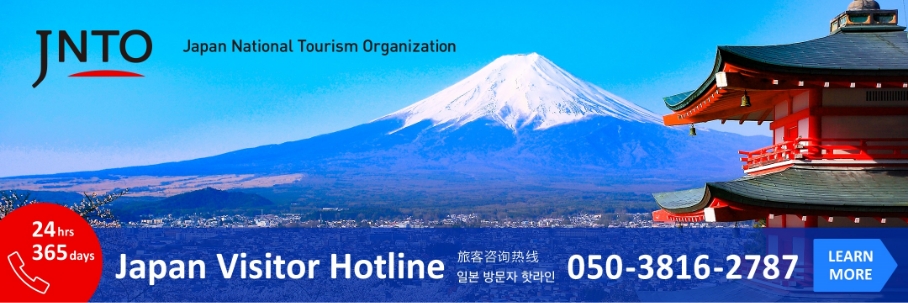
The Japan National Tourism Organization (JNTO) operates a 24/7 multilingual call center service "Japan Visitor Hotline". If you are a foreign visitor to Japan and are in need of assistance, please contact us.
Contact information for embassies
Ministry of Foreign Affairs links:『Foreign Missions in Japan』(English)
https://www.mofa.go.jp/about/emb_cons/protocol/index.html
- Meet the Team
- Work with Us
- Czech Republic
- Netherlands
- Switzerland
- Scandinavia
- Philippines
- South Korea
- New Zealand
- South Africa
- Budget Travel
- Work & Travel
- The Broke Backpacker Manifesto
- Travel Resources
- How to Travel on $10/day
Home » Asia » Japan » Guide To Japan Travel Insurance – ALL You Need To Know
Guide To Japan Travel Insurance – ALL You Need To Know
So, you’re headed to the Land of the Rising Sun? Great choice!
Japan is a MESMERISING blend of traditional culture and cutting-edge modernity. With its serene temples, bustling cities, iconic Mount Fuji, and cherry blossom festivals, there’s no place quite like it anywhere on earth.
And let’s not forget the delectable sushi, ramen, and sake that awaits every food enthusiast. Sounds delightful, right?
But, while Japan is known for its impeccable public manners and one of the world’s lowest crime rates, why take a risk when it comes to unforeseen mishaps?
Here, we’ll discuss everything you need to know about travel insurance for Japan , ensuring you’re covered for every adventure in this beautiful nation.
By the end of this post, we will answer all of your Japan travel insurance questions.
Do I Need Travel Insurance For Japan?
What should travel insurance in japan cover, what else should japan travel insurance cover, what is the best japan travel insurance, how to choose the right japan travel insurance for you, final thoughts on japan travel insurance.
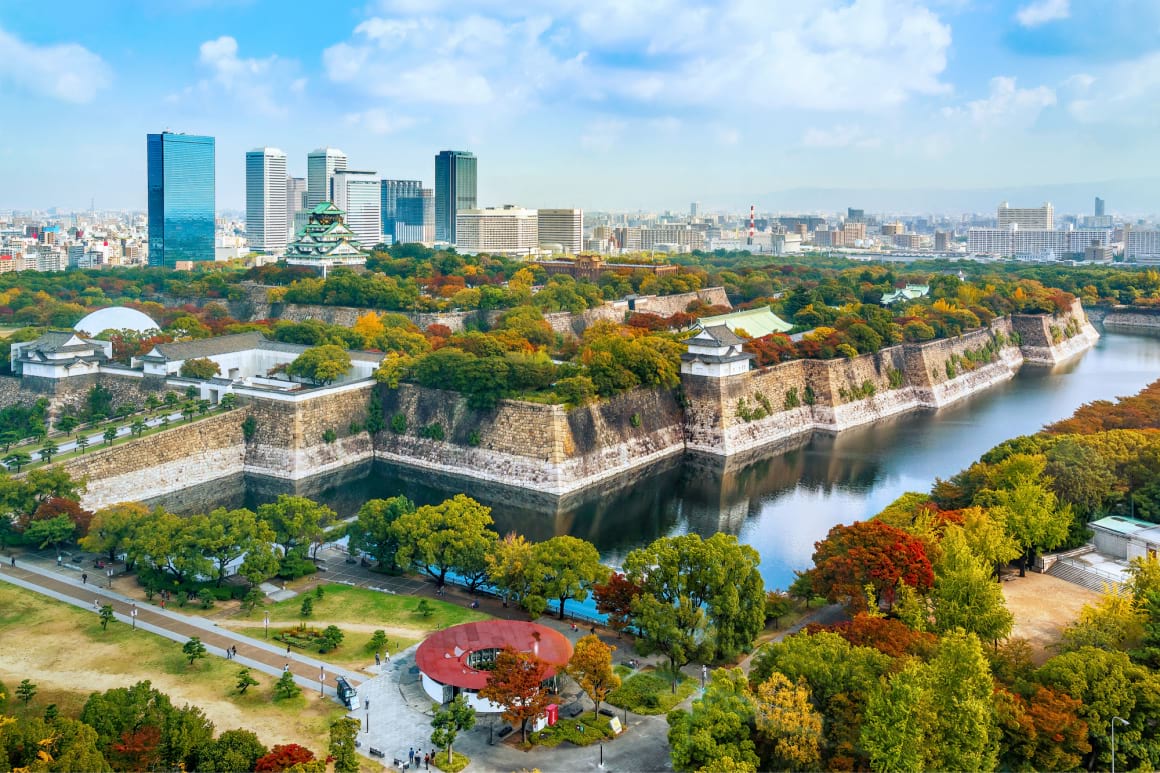
Japan is largely seen as a very safe country. Its cities are clean, and crime rates are significantly lower compared to global averages. But, as with any travel, unexpected events like natural calamities, health issues, or even simple travel inconveniences can arise. Japan is also known for its typhoons and earthquakes as well as a fee nasty tropical diseases.
While Japan doesn’t specifically mandate travel insurance for short-term tourists, considering the high cost of medical care inside the country, it’s highly advisable to have insurance coverage during your stay.
In essence, if you’re backpacking around Japan , having the best travel insurance for Japan ensures peace of mind, allowing you to immerse in the culture worry-free.

Unlock Our GREATEST Travel Secrets!
Sign up for our newsletter and get the best travel tips delivered right to your inbox.
Healthcare in Japan
The Japanese healthcare system is top-notch, with some of the world’s most advanced medical technologies and practices. Both public and private healthcare facilities maintain high standards, and English-speaking medical staff are available in urban areas.
However, medical treatment in Japan can be hazardously expensive for tourists. A simple doctor’s visit can range from ¥5,000 to ¥10,000 ($50 – $75). Hospitalization and surgeries can run into several thousand dollars.
For tourists, it’s essential to have travel insurance that covers any potential medical expenses, allowing you to access the best healthcare services without burning a hole in your pocket.
Crime in Japan
Japan boasts some of the lowest crime rates globally. Violent crimes are rare, and streets are safe, even late at night. My friend even left an expensive jacket on a park bench only to find it still there several hours later.
However, like any other tourist destination, petty crimes like pickpocketing in crowded places or thefts can occur sometimes.
While Japan is quite safe , having travel insurance that covers loss of valuables can be a lifesaver, ensuring that lost items don’t ruin your trip.
Issues Facing Travellers in Japan
While Japan offers an impeccable travel experience, there are issues tourists should be aware of:
- Natural Disasters : Japan is prone to earthquakes, tsunamis, and typhoons. These can lead to travel disruptions.
- Language Barrier : Despite the prevalence of English, language can still be a barrier, especially in rural areas. This can make navigating medical emergencies tricky.
- Lost Passports or Valuables : While rare, losing essential documents can be a hassle.
Popular Activities in Japan and Their Associated Risks
Temple Hopping : Touring ancient temples and shrines is my favourite activity. However, some are located on hills or require extensive walking.
This is a relatively sage activity unless you anger one of the gods! Then you need to be mindful of accidents due to falls, especially in crowded places or during festivals.
Skiing and Snowboarding : Areas like Hokkaido are popular for winter sports so Skiing-related injuries do occur every season. Note that not all insurance policies cover winter sports, so checking beforehand is essential.
City Exploration : Roaming cities like Tokyo and Osaka, using their intricate metro systems. Crowded trains can be overwhelming, leading to stress, or loss of belongings.
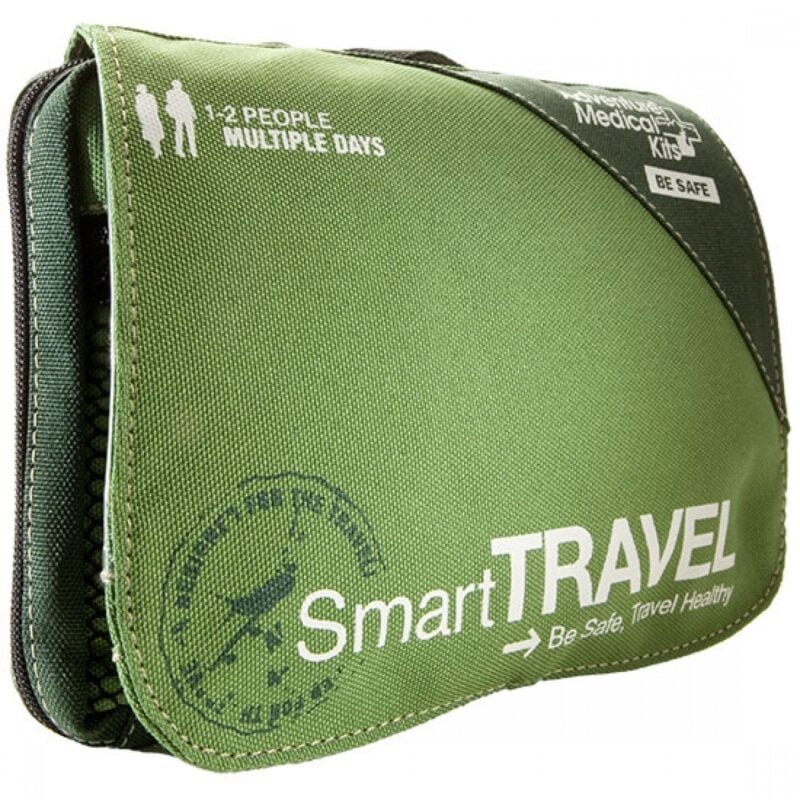
Things go wrong on the road ALL THE TIME. Be prepared for what life throws at you.
Buy an AMK Travel Medical Kit before you head out on your next adventure – don’t be daft!
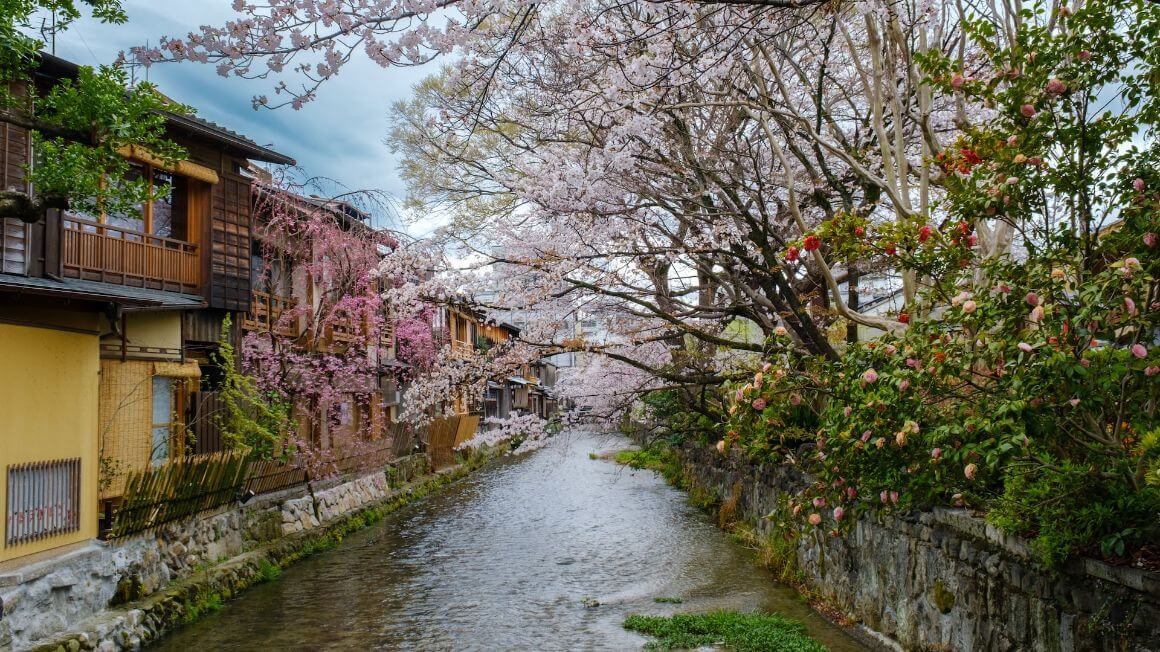
From what we’ve observed, the majority of travel insurance policies in Japan typically encompass the following:
- Emergency Medical Treatment for Accidents & Illnesses
- Personal Belongings and Luggage Coverage
Emergency Evacuation and Repatriation
Non-medical emergency evacuation.
- Coverage for Trip Cancellation
- Protection for Trip Interruption
We believe these elements are pivotal when comparing insurance options. However, we won’t delve into the details of each aspect here.
Emergency Accident & Sickness Medical Expenses
Emergency Medical costs are perhaps the single most important aspects of any travel insurance policy. If you have an accident or become seriously ill with a tropical illness, you may want to rest easy knowing that the medical costs and Doctors bills will be taken care of.
Many of you out there have probably never actually seen a medical bill. However, we have seen too many for our liking and believe us, they can get very expensive very quickly.
A friend of mine was once charged $10,000 for a leg infection in Costa Rica. Even 2 days in a Thai hospital cost him nearly $2,000.00! Thankfully he was insured on both occasions.
Pre-existing medical and health conditions may not be covered under this or they may be covered for an additional premium. Ideally, Emergency Accident & Sickness Medical insurance should offer at least $100,000.00 of coverage but some run into the millions. If you are visiting Japan, then do have a serious think about this.
Baggage and Personal Property
Coverage for luggage and personal belongings safeguards the worth of your bags and their contents. It’s most frequently utilized for misplaced luggage (and lost luggage was at all time high last year).
Many policies further extend this protection to include theft that occurs at your destination, which is especially valuable if you’re unfortunate enough to be robbed during your trip.
The coverage limits can differ across policies. Yet, it’s uncommon for the maximum coverage to surpass $1000, with individual item limits usually ranging between $250 to $500.
For many travelers, this might suffice. But if you’re journeying with expensive electronics like laptops or cameras, or specialized equipment like golf clubs, it might be worth considering additional gadget insurance.
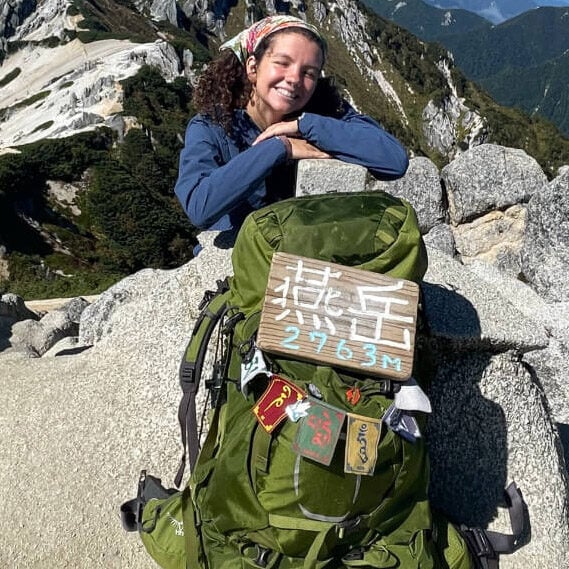
We’ve tested countless backpacks over the years, but there’s one that has always been the best and remains the best buy for adventurers: the broke backpacker-approved Osprey Aether and Ariel series.
Want more deetz on why these packs are so damn perfect? Then read our comprehensive review for the inside scoop!
Emergency evacuation covers the cost of sending you back to your home country in stressful circumstances.
Let’s say that the above mentioned tropical illness you catch is a very nasty one, and the decision is taken to send you home for further treatment; this will take care of the high costs of flying you home on a drip.
Repatriation is the cost of sending your remains home in the rare event that you die on your trip. Repatriation costs are not a burden I would want to leave to my family.
Whilst this is thankfully rare, I do come across Facebook or “Go Fund Me” campaigns for somebody’s body to be flown home.
Non-medical Emergency Evacuation is when you have to be evacuated because of some sudden crisis.
Examples are the outbreak of war/civil unrest and natural disasters that decimate infrastructure such as the South Asian Tsunami of 2006 or one of the earthquakes which do strike Japan.
In more recent times, the Corona COVID-19 outbreak created the biggest international emergency evacuation situation ever. (FYI – it straddled both the medical and non-medical evacuation boundaries).
Emergency evacuation insurance covers the costs of having to book an emergency flight home ( which can be seriously expensive) and will also cover accommodation costs if you end up being flown to a random, “safe” country rather than going straight home.
Trip Cancellation
Having to cancel an adventure that you were truly excited for is painful. However, being left out of pocket just makes it worse.
Trip Cancellation insurance can help you to recover the ‘non-refundable costs’ of your trip such as flight and hotel costs. Visa’s are also in this category.
To clarify, you can’t claim this simply because you changed your mind about the trip or fell out with your travel buddy. Proper cancellation reasons are things like sickness, family emergencies, bereavement, natural disaster and war – you get the gist.
Bearing in mind how much many some travellers spend on their dream Japan trip, this cover is one worth having in your back pocket.
Trip Interruption
Trip Interruption is when something goes wrong, even interrupts, and you have additional costs to pay because of it.
One example, when your pre-paid hotel falls down and you are forced to book another one. Another example is when your flight home is cancelled and you need a few extra nights at your hotel.
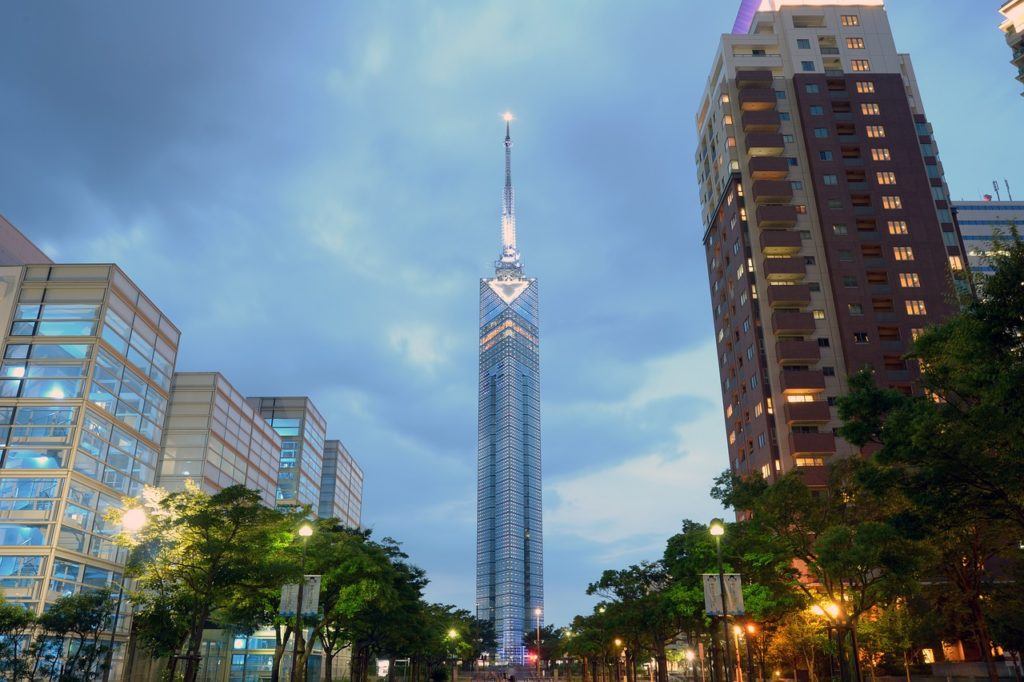
The above are what we consider to be the basic, bare-bones of travel insurance policies. However, some policies do offer a few more aspects to them. The very best Japan travel insurance policies may also include the following:
Adventure Sports and Activities
Please note that adventure sports and activities are not covered by all travel insurance policies. The definition of adventure sports and activities really does vary between providers but for example, can include:
- Trekking (altitude is usually a factor here)
- Swimming with Whales
- Improvised football games….
If you are going to be doing anything remotely physical or outdoorsy on your trip, then it may be sensible to check that your insurance provider is covering it. Broken jaws hurt enough without having high medical bills attached to them.
Accidental Death and Dismemberment
Accidental Death & Dismemberment cover doesn’t cover any travel related expenses as such but instead it basically provides you (or your next of kin) with monetary compensation in the event that something happens to you.
If you die, your loved ones get a payout. Or, if you lose a digit, YOU get a payout. I mean, how much is a finger really worth to you anyway?
It’s kind of like having a bit of life cover attached to your travel insurance.
“Well dear, I’m afraid there is good new and bad news. The bad news is that your parents both died on their trip to Japan. The good news is that you get $10k!”
Gear and Electronics Cover
Some insurance policies do cover electronic gadgets, but others do not. Those that do, sometimes charge an additional fee and they also usually limit the maximum item value.
If you only travel with a phone or a tablet then your travel insurer may well cover it entirely. However, if you’re travelling with a quality laptop , then you may wish to consider obtaining gadget cover.
Personally, I have had separate gadget cover in place on my trusty MacBook Pro for years now.

A new country, a new contract, a new piece of plastic – booooring. Instead, buy an eSIM!
An eSIM works just like an app: you buy it, you download it, and BOOM! You’re connected the minute you land. It’s that easy.
Is your phone eSIM ready? Read about how e-Sims work or click below to see one of the top eSIM providers on the market and ditch the plastic .
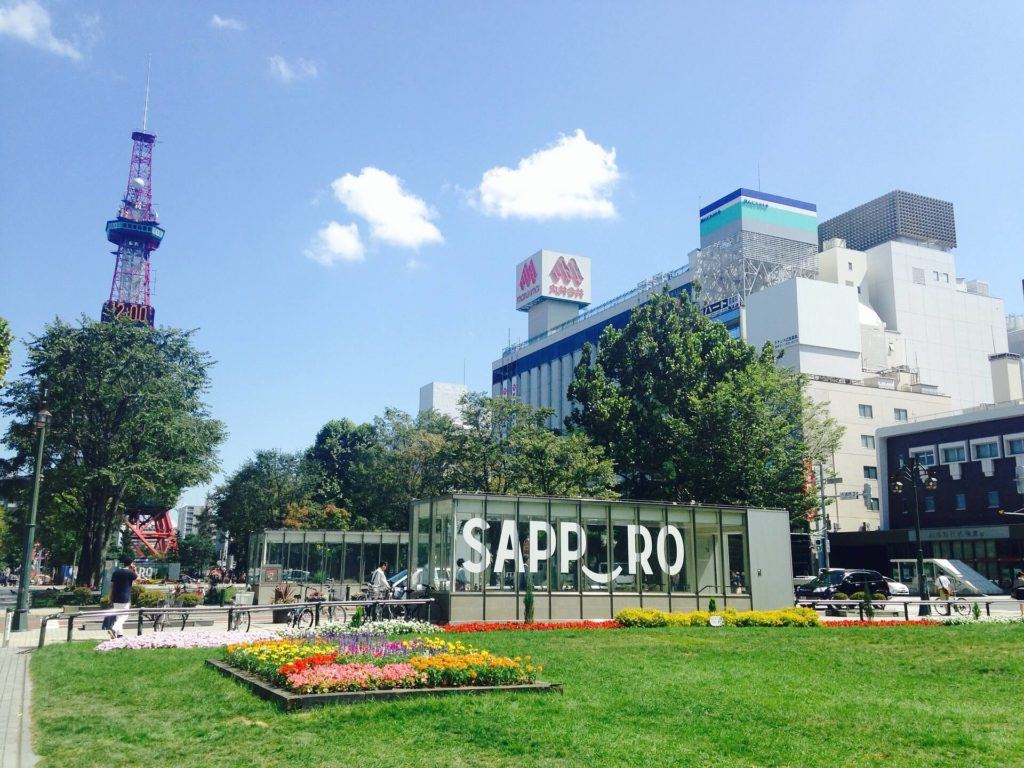
While it might appear that all travel insurers are the same, they each bring unique offerings to the table. Some provide more affordable rates, while others prioritize extensive coverage. There are insurers known for their stringent claims process, and there are those celebrated for their fairness and assistance.
Travel insurance – consistently inconsistent. We cannot, and should not, declare one as the superior choice. Insurance is intricate, with policies crafted based on vast data and numerous factors.
The best travel insurance hinges on your destination, travel time, and most crucially, your personal requirements. An insurer perfect for one journey might not suit another.
In the following section, we spotlight several travel insurance providers we’ve personally utilized over the years.
SafetyWing are a relatively new player in the travel insurance space but are already making big waves. They specialise in cover for digital nomads and they offer open ended cover on a monthly subscription basis.
Because they primarily cover digital nomads, they don’t offer much in the way of trip cancellation or delay so do take that into consideration.
However, SafetyWing really excels on the health side of travel insurance, covering dental and some complimentary treatments. In fact they even allow young children to be covered for free.
If cancellation and delay is not a concern for you or if you will be spending some considerable time on your trip, then consider SafetyWing travel insurance .
- Emergency Accident & Sickness Medical Expenses – $250,000
- Baggage and Personal Property – $3000
- Emergency Evacuation and Repatriation – $100,000
- Non-Medical Emergency Evacuation – $10,000
- Trip Cancellation -$0
- Trip Interruption – $5000
If you need more information, or want to get a quote, then you can visit the website for yourself.
Talk about efficient and effective, Heymondo are up-to-date when it comes to combining travel insurance with technology in the digital world of 2024.
What truly sets them apart is their assistance app offering a 24-hour medical chat, free emergency assistance calls and incident management. How reassuring is that?!
They also have a convenient and complication-free way to make a claim straight from your phone.
Medical expenses are covered up to $10,000,000 USD so try not to damage yourself anything over that amount… If you’d like travel insurance that operates with that little extra swiftness and ease, give these guys a go.
They offer multiple options – single trip, annual multi-trip and long stay. We’ve focused on single trip, but do check out the others and find what fits your next adventure.
- Emergency Accident & Sickness Medical/Dental Expenses –$10,000,000 USD
- Baggage and Personal Property – $2,500 USD
- Repatriation and Early Return – $500,000 USD
- Non-Medical Emergency Evacuation – $10,000 USD
- Trip Cancellation – $7,000 USD
- Trip Disruption – $1,500 USD
- Covid 19 coverage included in all plans
If you need more convincing, click our link below to get 5% off your Heymondo travel insurance plan!
Columbus Direct
Named after one of history’s greatest (and most divisive explorers), Columbus Direct also specialise in insuring adventure-hungry explorers like us. They have been providing award-winning insurance for 30 years.
What we like about this plan is that it does cover small amounts of personal cash. However, Gadget Cover is not available.
Columbus Direct actually offers a number of different travel insurance plans. Below we have focused on 1 of these and have set out the coverage amounts for the Globetrotter plan.
- Emergency Accident & Sickness Medical Expenses – $1,000,000
- Baggage and Personal Property – $750
- Emergency Evacuation and Repatriation – $1,000,000
- Non-Medical Emergency Evacuation – $0
- Trip Cancellation -$1,000
- Trip Interruption (“Catastophe”) – $750
If you need more information or want to get a quote, then you can visit the website for yourself.
World Nomads
World Nomads have been insuring backpackers for 20 years now. Its a backpacker travel insurance company, and their policies cover long way travel on one way tickets, trips to multiple countries, and a whole lot of adventure activities.
These guys are well used to dealing with backpackers like us, and they are regularly recommended by travel bloggers and industry insiders. We love them.
They offer 2 different policies depending on your needs. The Standard Plan is standard & the Explorer Plan covers a whole host of high risk, high fun activities.
World Nomads are also one of the few travel insurers who will write you a policy after starting your trip. The one downside for us is that they don’t cover Pakistan.
Let’s look at the maximum coverage amounts with both the Standard & Explorer plan.
- Emergency Accident & Sickness Medical Expenses -$100,000/$100,000
- Baggage and Personal Property – $1000/$3000
- Emergency Evacuation and Repatriation – $300,000/$500,000
- Non-Medical Emergency Evacuation – $25,000/$25,000
- Trip Cancellation -$2500/$10,000
- Trip Interruption – $2500/$10,000
If you want more info or to get a quote then visit the World Nomads site for yourself and take a look.
Iati Seguros
Iati Seguros is a Spanish based travel insurance company who we have personally used and loved. You will notice that they provide competitive cover amounts for the key travel insurance areas, and are competitively priced. So far we have heard nothing, but good things about them.
They also offer multiple ones, but we have focused on the Standard Plan although we wholly encourage checking out all plans for yourself to identify the best one for your needs.
Standard Plan
- Emergency Accident & Sickness Medical Expenses – $200,000
- Baggage and Personal Property – $1000
- Emergency Evacuation and Repatriation – 100% of cost
- Trip Cancellation -$1,500
- Trip Interruption – 100% of cost
Insure My Equipment
Insuremyequipment.com does precisely what the name suggests. They are an online insurer for expensive equipment (like camera gear & gold clubs). You can use them to get specific pieces of gear insured but please bear in mind this policy is only for your specified gear.
An Insure My Equipment policy works well in combination with other travel insurance. Insure My Equipment policies are an excellent choice for professionals and backpackers with more $0000’s worth of camera equipment, expensive laptops, or fishing rods.
I also know a few travelling musicians and DJs who use these guys so you are in cool company.
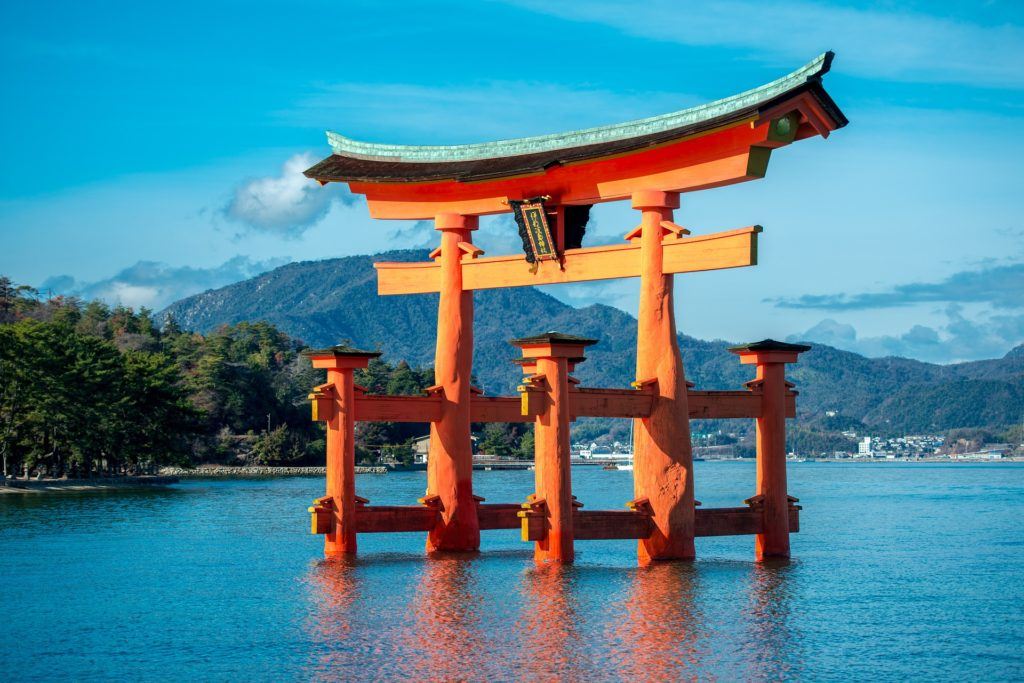
Choosing the right travel insurance for your Japan holiday is like choosing a pair of hiking boots – it’s something only you can do by looking at your budget, your needs, and looking at what feels right for you.
You need to work out how much your trip is worth, how much equipment you plan to take and what activities you intend to engage in.
Naturally, you should evaluate your budget – considering both what you’re willing to spend on coverage and what you can bear to lose if you need to file a claim.
At times, a cost-effective backpacker insurance in Japan may suffice, while in other instances, investing a tad more could be beneficial.
If the insights in this article don’t guide your decision, then my efforts over the past 5 hours might’ve been in vain!
Japan is undeniably a traveler’s delight. But, as with any trip, it’s always wise to be prepared for the unexpected. And, investing in comprehensive travel insurance for Japan allows you to enjoy every moment, knowing you’re covered for unforeseen events.
The Japan travel insurers we mentioned here are just a small selection of the many available. Hopefully one of them answers your needs but if not there are others out there.
We hope you found this Japan travel insurance guide helpful. If so please let us know by leaving a comment below.

And for transparency’s sake, please know that some of the links in our content are affiliate links . That means that if you book your accommodation, buy your gear, or sort your insurance through our link, we earn a small commission (at no extra cost to you). That said, we only link to the gear we trust and never recommend services we don’t believe are up to scratch. Again, thank you!

Aiden Freeborn
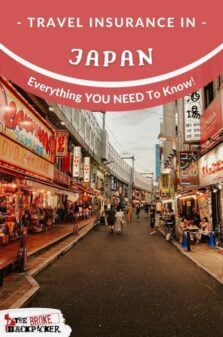
Share or save this post

Leave a Reply Cancel reply
Your email address will not be published. Required fields are marked *
Save my name, email, and website in this browser for the next time I comment.
Notify me of followup comments via e-mail.

- About Our Policies
- Statistics/White Paper
- Information
Information on illnesses, injuries, and disasters
Last Update : 2024/3/22
【1】Preventing Infectious Diseases While Traveling
【2】what to do if you feel unwell.
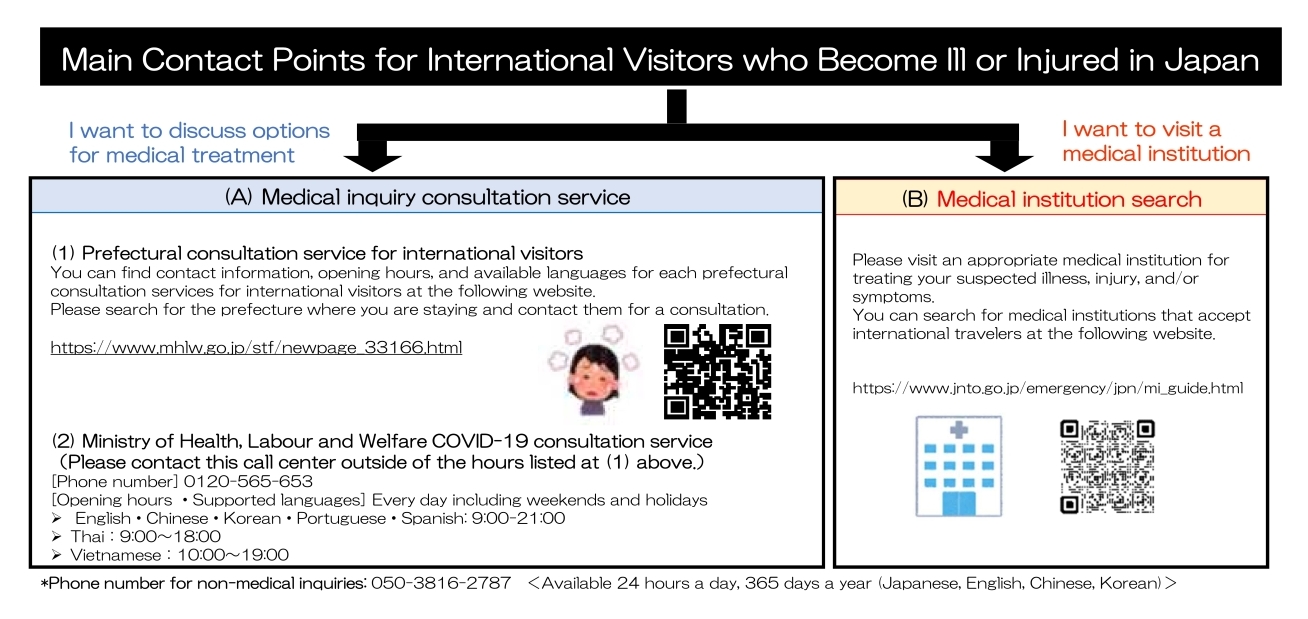
【3】A guidebook to help you when you feel sick
【4】private medical insurance subscription recommendation tool.
【For arrival in Japan】 English
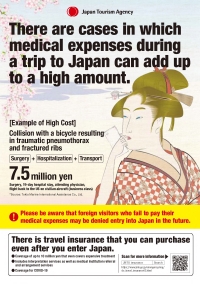
○English Click here for PDF ○Chinese( in simplified Chinese characters ) Click here for PDF ○Chinese( in traditional Chinese character ) Click here for PDF ○Korean Click here for PDF
【For before departure】 English

○ English Click here for PDF ○Chinese( in simplified Chinese characters ) Click here for PDF ○Chinese( in traditional Chinese character ) Click here for PDF ○Korean Click here for PDF
【5】Leaflet compiling useful information for foreign tourists visiting Japan in the event of a disaster
【6】disaster information provision app.
- About the JTA
Inquiries Regarding This Page
Inbound Tourism Promotion Division Japan Tourism Agency Mail: hqt-traveletiquette★gxb.mlit.go.jp ※Please convert ★ to @
- Tokyo Cheapo (繁體中文)
Finding the Right Travel Insurance for Japan
Here’s what you need to know about travel insurance for Japan, with a comparison of some of the options available—including those that you can book when you’ve already started your trip.
A short but necessary disclaimer: Getting travel insurance is important, but we can’t make the decision for you. We can only provide information to hopefully make that decision a bit easier. Also, please note that we do not sell or provide insurance ourselves.
Note: Antibody tests and PCR tests needed for travel purposes are generally not covered by travel insurance. As always, read the T&Cs carefully!
- Do I need travel insurance for Japan?
- Coverage for flight delays & lost luggage
- Japan travel insurance essentials
- Compare travel insurance providers for your trip to Japan
Japan travel insurance FAQs
You are ready for the adventure of a lifetime in japan what could possibly go wrong a lot, actually..
Apart from the obvious travel disasters (think lost luggage, pinched passports or canceled flights), getting sick abroad is, unfortunately, a possibility—and one you’d be well-advised to insure yourself against.
While getting a basic prescription for medicine in Japan is generally affordable out of pocket, more serious medical considerations like hospitalization or transport back home can easily run into the thousands of dollars (US). Having a travel insurance policy can give you some peace of mind, and is something most travel experts recommend. We may be Cheapos, but we believe in playing it safe.
Do I really need travel insurance for Japan? I heard it is one of the safest countries in the world.

Good point. Japan is ranked as one of the safest countries in the world, with extremely low reported crime rates. But, while you may not have to worry too much about your stuff getting stolen, there are other things to consider, besides falling ill.
For example, Japan is frequently hit by typhoons . The typhoon season generally runs from late July to early October, but has started earlier and finished later in recent years. A big typhoon can lead to canceled flights, long delays or canceled trips and tours. There are also earthquakes and other concerns .
Aren’t delayed flights and lost luggage covered by airlines?
Almost all airlines will reimburse you for lost and delayed luggage, as well as canceled flights. But you’ll need to check the conditions on your ticket carefully, to be sure. While most travel insurance policies offer this as part of the package, you probably don’t need to double-insure yourself on this.
But things become fuzzier for your trip overall; think about the bullet train tickets and tours you might book in Japan. While you can often get refunds for tours canceled due to bad weather, you might be stuck with hotel and transport bookings that you don’t need anymore if your tour is called off. Many travel insurance policies click into gear in this case.

COVID-19, Japanese encephalitis and other health concerns
In light of the coronavirus (COVID-19) pandemic, many travelers are understandably worried about their upcoming travel plans. More on that below.
An older concern is Japanese encephalitis, which can be contracted via mosquito bites across most of Asia—not only in Japan. Luckily, it is extremely rare. It is estimated that less than one in a million travelers to Asia will contract the disease, and for most humans, it will be asymptomatic. A vaccine is available, but only recommended for those who will stay longer than one month in high-risk areas. Generally, bug-bite prevention is recommended as a first-line defense.
Other than that, it’s generally advisable to check that all your vaccines are up to date before embarking on your Japan trip.
Travel insurance and cancelations due to COVID-19
You might be wondering if your insurance covers cancelations due to COVID-19. In short, it will vary depending on your insurance provider. As always, check with your travel insurance provider and read the fine print and special conditions carefully. Never assume anything!
Travel insurance for Japan: What should your policy cover?

Generally speaking, the biggest items when it comes to travel incidents are medical expenses and emergency evacuations, which can run into the tens and even hundreds of thousands of dollars. So check that the Japan travel insurance or Japan travel health insurance policy you sign up for provides enough cover to make you feel comfortable.
Keep in mind that medical expenses really are for unforeseen situations and emergencies like accidents, or getting sick on the road. Medical tourism, check-ups or preventative treatments are usually not covered.
Anything else you might want to add to your travel insurance policy for Japan depends on what your itinerary looks like.
Comparing Japan insurance options for different types of travelers
Just a quick note before we get into it (another disclaimer): Always read the policy wording for any insurance very carefully before signing up. Terms and conditions can change over time, and also differ depending on factors like your age, country of residence, or how high you want your cover to be.
We can’t recommend one best Japan travel insurance policy for everyone because we all travel differently, but we hope this overview is a starting point for you to find travel insurance for Japan that suits you, personally, best. Also, prices are subject to change.
Travel medical insurance: SafetyWing

SafetyWing offers travel medical insurance at affordable rates, starting from approximately US$42 for four weeks, for travelers under 40.
What is different about their plan is that you can extend it indefinitely, until it reaches the maximum of 364 days — after which you can renew your policy. This makes it an interesting choice for long-term travelers and digital nomads. SafetyWing rolled out their travel medical insurance a few years ago and recently added other health insurance products for those without a fixed residence in one country.
A bonus is that you can kick off your SafetyWing travel medical insurance plan any time, even when already on the road . Besides emergency medical, their policy also covers the travel basics, including trip interruption, personal liability and lost luggage. Since August 1, 2020, SafetyWing has also covered COVID-19, and from April 15, 2021, unplanned quarantine is covered, too.
While it may be a fairly new kid on the insurance block, founded in 2017, SafetyWing is underwritten by Tokio Marine, one of the biggest underwriters in the world.

Another option for Southeast Asians: FWD
If you are from Singapore, Thailand, Vietnam, Malaysia, Indonesia, Hong Kong , Macau, Cambodia or the Philippines, you might want to take a look at FWD for travel insurance. Another fairly new insurer, they are expanding throughout Asia and seem to offer some of the cheapest plans we could find online, starting from approx. ¥ 2,200 for a single trip to Japan.
Their plan ticks all the usual travel insurance boxes, including medical evacuation cover, which is unlimited. It also seems to cover skiing—but confirm this with them.
Two other Japan travel insurance options: Atlas International and Travelex

Starting at approximately ¥ 1,800 for a two-week trip to Japan, Atlas International is available to citizens of most countries. They offer you the option to play with the sliders, so you can e.g. add a deductible to bring down the premium or push up the cover if you are happy to pay a bit more.
Travelex has been around for quite a while and is a popular choice with North Americans. They have a good reputation and their starting rates are affordable; however, their medical expense cover for US citizens might be a bit low, depending on your needs.
Japan travel insurance comparison chart
Here is a quick, rough comparison of the different insurers we’ve mentioned that offer cover for trips to Japan for global citizens. Remember, all prices are approximate and subject to change and will vary depending on your age, country of residence, length of stay and specific circumstances! Where basic vs. extended plans were available, we picked basic for the sake of comparison.
Scroll to see all the options, if they don’t show up on your screen.
Coverage overview
This is intended as a very brief overview only. Always check the coverage and T&Cs carefully on your own!
Notes on the insurers: Allianz Travel offers three different levels of coverage from Bronze to Silver, with varying premiums and covers. Available to residents of Singapore. --> SafetyWing has a higher premium for those over 39 years of age. Travelex is a US insurer, but available for global citizens. Conditions may vary by country of residence, age and—notably—the total value of your trip that you want to insure. FWD is available to citizens of 10 Asian countries and regions: Singapore, Malaysia, Cambodia, Indonesia, Vietnam, Thailand, the Philippines, Hong Kong, Japan and Macau, though the available insurance products differ by location.

You ask, we answer.
Is travel insurance required for Japan?
Generally, no—travel insurance is strongly recommended , rather than required, for Japan.
How much is travel insurance to Japan?
The cost of travel insurance for Japan depends on which provider you use for your policy. As a rough guide, it can range from ¥ 1,000 to ¥ 8,000 for a one-week trip, depending on your age, place of residence, itinerary, and preferences.
If you are under 40, a month-long travel medical insurance policy through SafetyWing will set you back approximately ¥ 4,700 , or 42 USD. It’s a good idea to compare multiple policies to work out which is the best deal for your visit to Japan.
What’s the best travel insurance in Japan for foreign residents?
If you are a foreign resident of Japan, looking for travel insurance for your upcoming trip OUT of Japan, you have access to the insurance providers listed above, as well as local providers. If you have a Japanese credit card , you could start by asking whether any travel insurance is provided through that, and go from there.
Post first published in February, 2020. Last updated in December, 2021.
- Health insurance
- Medical insurance
- Travel insurance
Get our Tokyo Cheapo Hacks direct to your inbox

Tokyo Sumo Guide: When and Where to Experience Sumo Wrestling

Best Budget Sushi Restaurants in Tokyo

Luggage Storage In Tokyo

Hidden Gems: Tokyo's BEST Underrated Shrines and Gardens

When to See Cherry Blossoms in Japan

Hakone Day Trip from Tokyo
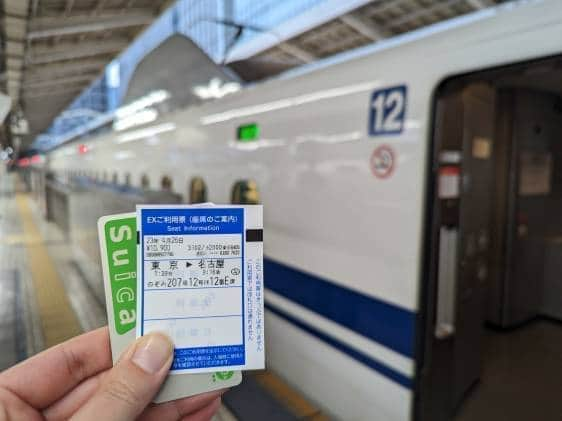
How and Where to Buy Shinkansen Tickets

English-Speaking Hospitals in Tokyo — And How To Visit Them
Absolutely everything you need to know about seeing a doctor in Japan.

Yozakura: 8 Best Nighttime Cherry Blossom Illuminations in Tokyo
Light-ups have been extended, since the blossoms were so late this year.

The Hokuriku Arch Pass: Taking the Slow Route Between Tokyo and Osaka
Meander along Japan's "golden route" — exploring Nagano, Kanazawa and more.

Spring Escapes: Top 7 Day Trips from Tokyo
Must-see cherry blossom, moss phlox, and wisteria locations — all easily accessible from Tokyo.

Ashi Angels: Hakone for Evangelion Fans
Explore the real Tokyo-3.

Top 10 Tokyo Cherry Blossom Festivals in 2024
Where to go for street food, music — and lots of sakura.
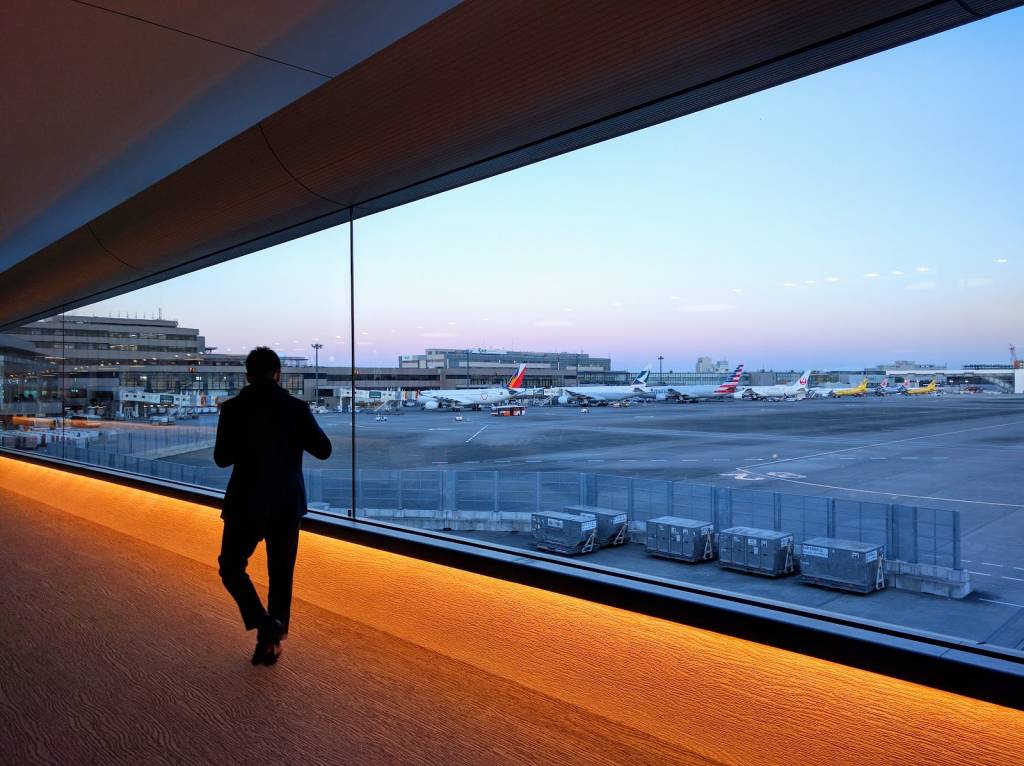
Finding the Best Transport From Narita Airport to Tokyo
How to get from the plane to your accommodation.

5 Stunning Spring Bus Tours From Tokyo
Take a ride to experience the best of the season.

Top 25 Easy Day Trips From Tokyo
Add a few of these to the wander list.

Tokyo to Osaka: Fast and Creative Ways of Getting There
Full guide to taking the bullet train, buses, and low-cost flights.

The Best eSIMs for Visiting Japan — Tested and Compared
See which provider offers the best deal.

The Best Tokyo Events, by Month
Find out what's happening in Tokyo throughout the year — and when to go.

Close without accepting
Please note that we do not handle domestic or international travel arrangements of any kind . We ask for your kind understanding that any inquiries received on weekends or holidays will be handled on the next business day.
- Can I bring my e-cigarette and vape liquid?
- Please send me maps/brochures.
- I understand that liquids cannot be brought onto the airplane, so how can I apply for tax exemption for cosmetics and so on?
- Do I need an International Driver's License to drive in Japan?
- Any restrictions on entering Japan?
- General Information
- Climbing Mt. Fuji
- Pass/Tickets
- Safe Travel
- Maps & Brochure Request
- Novel coronavirus (COVID-19)
Safety Information
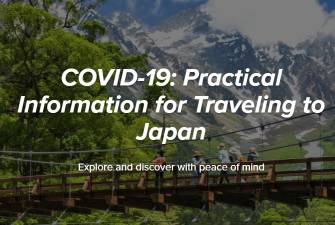
Resumption of tourism in Japan : What You Need to Know !
- Published on : 16/05/2023
- by : Japan Experience
- Add to favorites
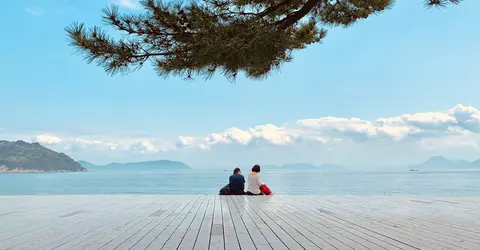
Naoshima Island
@Yuri Shirota, unsplash

Japan is finally reopening its borders to the world
This is it! Japan has finally relaxed all restrictions for travelers since the 11st of October.
Entry conditions, visas, COVID-19 tests, vaccines... Japan Experience details everything that you need to know about travel requirements in Japan.
Article updated on May 16, 2023
Resumption of inbound tourists in Japan
Fans of japan from all over the world have been waiting for this for more than two years. since october 11, it is again possible to freely travel to japan. visa waivers has been reinstated and travelers are no longer required to book a guided or self-guided tour to japan. .
Here is a summary of the current measures :
- Japan restores visa-free travel post-pandemic for short-stay visitors from United States, Canada, Australia and UK.
- A negative PCR test result less than 72 hours before the flight is no longer required for travelers, regardless of vaccination status.
- The vaccination certificate is no longer required.
- Travelers are invited to fill in the information requested by the Japanese authorities on Visit Japan Web prior entering Japan in order to facilitate controls upon arrival on the territory.
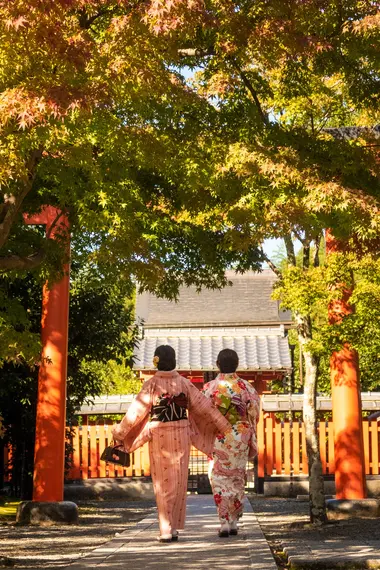
Women wearing Kimono, Kyoto
@Svetlana Gumerova, @unsplash
What are the formalities to travel to Japan as a tourist?
Since October 11, 2022, all travelers are now able to freely visit Japan, without any restrictions and subject to the same conditions as before the Covid-19 pandemic.
Before leaving, what steps to take?
- A valid passport
The visa exemption for temporary stays of less than 90 days for 68 countries* around the world is back in place. Only a valid passport is required.
- Health Insurance
Take out health insurance to cover medical expenses in case of hospitalization on site. Generally, the insurance linked to your credit card covers these expenses, but it is advisable to check the conditions, and if not, to subscribe to a third party insurance.
- Register to Visit Japan Web
Fill in the information requested by the Japanese authorities on the Visit Japan Web in order to facilitate controls upon arrival in Japan.
What is the assistance on-site?
In Japan, wearing masks on a daily basis is a well-established habit, even before the start of the Covid-19 pandemic. For the time being, you will find that most Japanese people continue to wear them in public places.
- As of May 16, masks are no longer mandatory outdoors, so long as social distancing is practiced and there is no physical contact.
- Masks are still strongly recommended on public transport, in hotels and in crowded places.
Demand for planning and organizing trips to Japan is now greatly increasing. Whether you want to travel independently or with a guide, Japan Experience is here to help you. We offer a unique range of accommodations , activities and products to make your trip easier: Japan Rail Pass , public transportation cards , driving license translation , pocket WiFi , SIM card , etc.
* EUROPE: Andorra, Austria, Belgium, Bulgaria, Croatia, Cyprus, Czech Republic, Denmark, Estonia, Finland, France, Germany, Greece, Hungary, Iceland, Ireland, Italy, Latvia, Liechtenstein, Lithuania, Luxembourg, Northern Macedonia, Malta, Monaco, Netherlands, Norway, Poland, Portugal, Romania, San Marino, Serbia, Slovakia, Slovenia, Spain, Sweden, Switzerland and the UK.
AMERICA: Argentina, Bahamas, Barbados, Canada, Chile, Costa Rica, Dominican Republic, El Salvador, Guatemala, Honduras, Mexico, Suriname, United States and Uruguay.
AFRICA: Lesotho, Mauritius and Tunisia.
MIDDLE EAST: Israel, Turkey, and United Arab Emirates.
OCEANIA: Australia and New Zealand.
ASIA: Brunei, Hong Kong, Indonesia, Macau, Malaysia, Singapore, South Korea, Taiwan and Thailand.
Highlights of Japan - Book your next trip to Japan Now

Highlights of Japan Self-Guided Tours in Japan
- Included : Airport Transfers, 3* Hotels & Ryokan, Non-flight transportation, Guided activity, Travel diary, Pocket wifi, Assistance
Entry to Japan
- The restrictions on entry into Japan in response to the Covid-19 pandemic have all been lifted since October 11 .
- For stays of less than 90 days, foreign tourists can travel freely to Japan without restrictions and under the same travel arrangements as before the Covid-19 pandemic.
Business travelers & Students
- B usiness travelers and students can apply for entry into Japan for a short or long stay for professional reasons (work visa, student visa) provided that they can prove that they can prove that they are being hosted or supervised by an organization located on Japanese territory (company, university...).
Family of Japanese Nationals and Permanent Foreign Residents
Family members of Japanese nationals and permanent foreign residents are allowed to apply for short-term visas.
Sanitary control measures and Quarantine
There are no longer any health control measures upon entry into Japan .
For both vaccinated and non-vaccinated travelers, it will no longer be necessary to present a vaccination certificate or a PCR test less than 72 hours old upon entry .
- For more information: Ministry of Foreign Affairs Japan
We strongly recommend that travelers regularly consult the latest updates and official travel recommendations:
- Japan National Tourism Organization
- Ministry of Foreign Affairs Japan
- World Health Organization Travel Advice
- UK Foreign and Commonwealth Office Travel Advice
- US Travel Department of State Travel Advice
- Australian Government Smart Traveller
- Government of Canada Travel Advice
- New Zealand Government Safe Travel
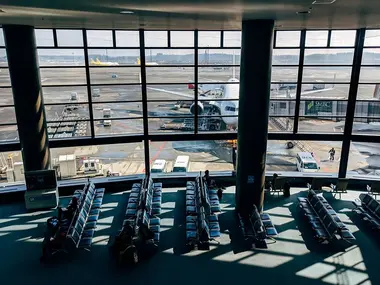
We will be updating this page with any new developments and Japan Experience looks forward to helping you plan your trip when the situation improves.
What is the current situation in Japan?
Cases remain low in Japan compared to other countries. The quasi-emergency in all prefectures has been lifted as new cases dip and the burden on regional medical systems comes under control.
Japan’s vaccination campaign has been successful: as of May, 2023, 81% of the total population has received at least one shot and 80% of the total population has received their second dose.
Note that the quarantine requirements for eligible travelers have changed. There is no quarantine for those who are fully vaccinated and who has received their booster shot.
For more information about the new travel requirements, we recommend travelers to check the official website .
Wearing of mask
In Japan, wearing a mask on a daily basis is a well-established habit, even before the start of the Covid-19 health crisis. For the time being, most Japanese people continue to wear them in public places.
- Since May 16, the wearing of masks is no longer compulsory both outdoors as long as social distancing is practiced and there is no physical contact.
Applications to download
For tracking the evolution of the coronavirus epidemic, the Japanese government recommends downloading several applications:
- MySOS, the health and location monitoring application (it will be used to confirm your location, health status and housing).
- COCOA, the COVID-19 contact confirmation application (it will be used to notify you of a possible contact with a COVID-19 positive person).
For more details, please read the document : G uideline for using the covid application in Japan
Our guideline for using MySOS & Visit Japan Web
- Upload an electronic certificate of Testing for COVID-19 with negative test result conducted within 72 hours prior
- Input basic information for entering Japan
- Input information for immigration procedure
- Input information for customs procedure
- Show an electronic certificate
- Show a two dimensional code for immigration procedure
- Show a QR code for customs procedure
What precautions should travelers take when traveling in Japan?
Due to the evolution of the global health crisis, the measures taken by each country have undergone significant changes since 2020, and are likely to change again.
For cross-border and international travel, we invite you to follow the official recommendations of the governments of the countries where you live and where you wish to go.
It is recommended to take out travel insurance for your trip to Japan. Medical expenses can be high if you become sick or injured and need to visit a hospital while in Japan. It is important to check the policies including Covid-19 coverage.
In case of emergency, the JNTO has created a dedicated page on the health & safety for travelers in Japan: find the medical institutions suited to your needs and information about insurance companies available to visitors: visit here!
We advise seniors and people with chronic illnesses, who may be at a greater risk of catching Covid-19, to consult a health professional before traveling.

Coronavirus in Japan
Japan visitor hotline
The Japan National Tourism Organization (JNTO) operates a traveler hotline all year round 24 hours a day. They can help with tourist information or assistance, including Covid-19.
This service is available in English, Chinese, Korean and Japanese.
- From Japan: 050-3816-2787
- From Overseas: +81-50-3816-2787
Japan Experience is at your disposal to answer your questions and needs by email and phone.
- Have you placed an order with Japan Experience? You have received a credit note for the postponement of your trip with Japan Experience? Read this article : H ow to cancel your trip to Japan?
Be the first to know about our latest news by subscribing to our newsletter: https://www.japan-experience.com/newsletter  ;
Explore Japan with your family

Japan family tour Self-Guided Tours in Japan
Latest Articles

Tokyo Fashion Week as a visitor to Japan
Undeniably influential to the development of the modern fashion landscape, Tokyo is widely considered a mecca for fashion enthusiasts for its distinct range of aesthetics and environment that allow
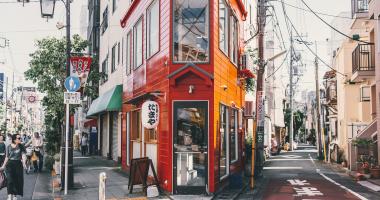
New places to discover in Japan in 2024
Will you be traveling to Japan this year? Dive into an enchanting journey through new places to discover.

TeamLab Borderless: reopened and reimagined at Azabudai Hills
Few art collectives have garnered the international recognition and appeal of the TeamLab group, initially founded in 2001 in Tokyo, Japan.
Please select your country on the list below:
- Switzerland
- United Kingdom
- Other countries
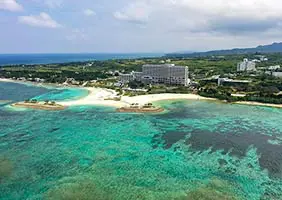
- Okinawa at a Glance
- World Heritage
- Traditional Culture
- Food & Longevity
- Wonderful Nature
- Beach information
- Okinawa Main Island
- Kume Island
- Kerama Islands
- Miyako Islands
- Yaeyama Islands
- Nature & Wildlife
- Heritage & Tradition
- Flavors of Okinawa
- Shopping & Relaxation
- Activities & Experiences
- Okinawa Life
- Recommended Trips
- Getting to Okinawa
- Getting Around
- Useful Information
- When to Visit
- Accommodations
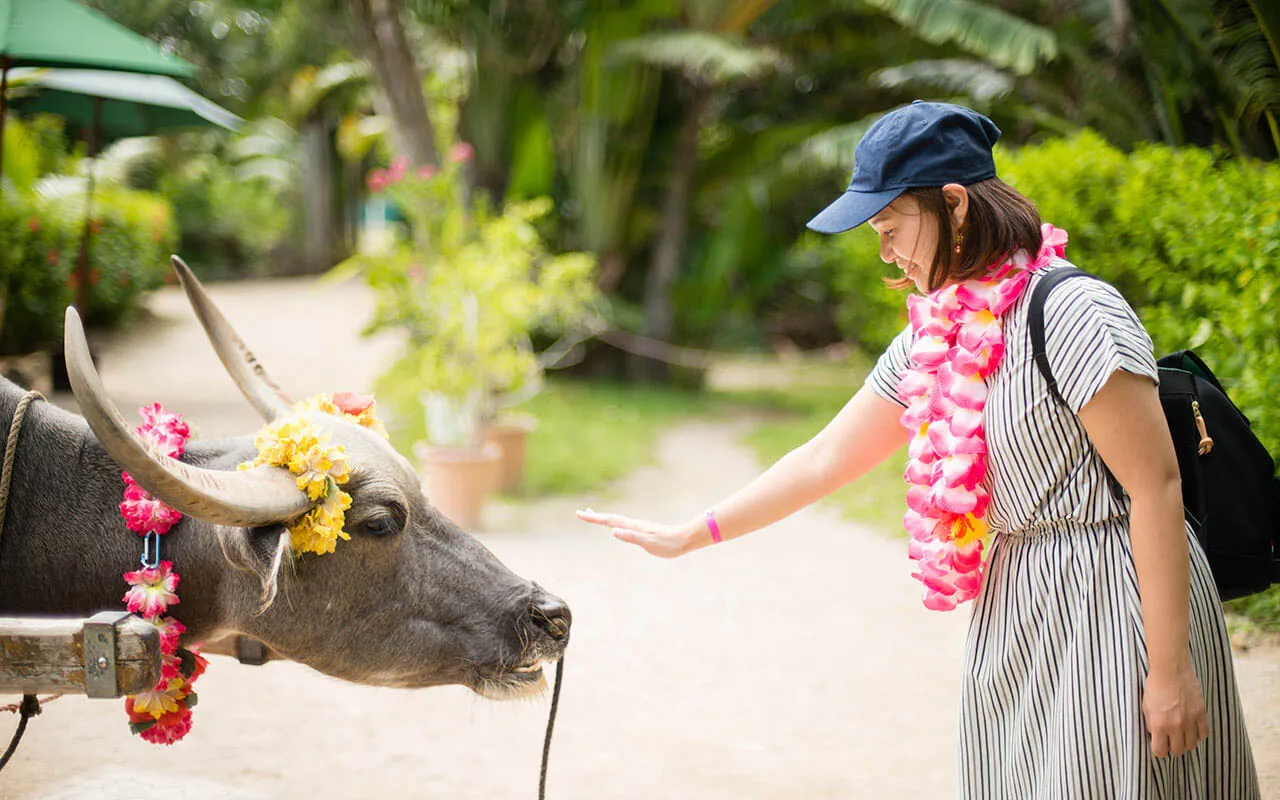
Okinawa 101—All the information you need for a first-time trip to the islands
Visiting the islands of Okinawa for the first time is an exciting experience. Fully prepare for your trip by browsing the useful information below. From where to find free Wi-Fi and tax-free shopping to important information on natural disasters, all the essentials are covered here.
Essential Information
Health & insurance, tourist information, staying safe.
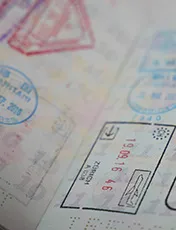
Visa & Immigration
Check whether you need a visa to travel to Japan and always travel on a valid passport with sufficient time remaining before the expiry date. While traveling in Okinawa, keep your passport with you at all times as you may be asked to present it for identification. If you lose your passport, file a report with the police, and contact the appropriate embassy.
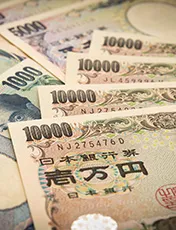
Currency & Currency Exchange
The currency in Japan is the Japanese yen (¥). Credit cards and contactless payment methods are generally widely accepted in urban areas, but many small shops and businesses in rural areas and on small islands will only accept cash. You can exchange currency at the airport, at certain ATMs, and exchange bureaus around the islands. If you are bringing cash with you, note that amounts exceeding 1 million Japanese yen need to be declared at customs.

Free Wi-Fi is available at most accommodations, at some tourist facilities, and in some urban areas. Check with your accommodation at the time of reservation regarding Wi-Fi availability. Okinawa Prefecture operates the free Wi-Fi service Be.Okinawa Free Wi-Fi. See the user guide for instructions and check the area map for locations.
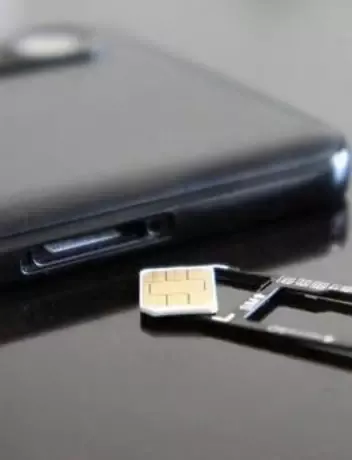
SIM Card & Mobile Router
For uninterrupted access to the internet, consider renting a mobile router or purchasing a SIM card. At the arrival lobby of Naha Airport International Terminal, you can purchase a SIM card or rent a mobile router.

Voltage & Plugs
When bringing electronic devices that require plugging in, make sure they are compatible with Japanese voltage specifications and electrical sockets. Japanese plugs are A type. The voltage is 100V, and the frequency is 60Hz.
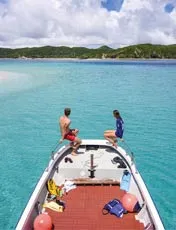
Manners & Customs
Okinawa is a welcoming and relaxed destination free from taxing social etiquette. Following a simple code of respect for the people you meet and places you visit is all you need for a pleasant and enjoyable Okinawa experience.

Illness & Injury
If you fall ill or receive an injury and require urgent medical attention, go immediately to hospital or call 119 for an ambulance. For non-emergency illnesses and injuries, call the Be.Okinawa Medical Interpretation Contact Center. Hotline staff can advise you on where to get medical treatment and can refer you to clinics that offer services in foreign languages.
Be.Okinawa Medical Interpretation Contact Center: 0570-050-235 Languages available: English, Chinese (Mandarin, Cantonese), Korean, Portuguese, Tagalog, Vietnamese, Spanish, Indonesia, Thai, Nepali, French, Russian, Burmese, Hindi, Mongol, Persian, Taiwanese (total of 18 languages)
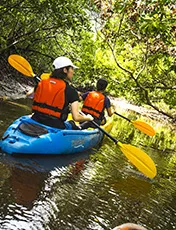
Travel Insurance
Purchasing travel insurance that provides sufficient coverage and services can give you peace of mind in the event of an unexpected injury or illness during your trip. Hospital visits and emergency services can be very costly, so insurance is a wise precaution. See the Japan National Tourism Organization’s Guide for when you are feeling ill for more information on travel insurance and what to do in the event of an injury or illness.
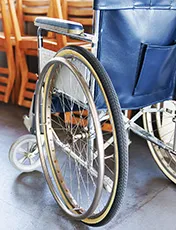
For All Visitors
Okinawa welcomes all. Get the information you want, know where to get support if you need it, and find out about the wide array of services offered across the islands. Okinawa welcomes everybody to enjoy the rich beauty of its diverse islands.

Contact Center
Email or call the OKINAWA Multilingual Contact Center for tourist information, interpretation services, and assistance during your visit to Okinawa. Calls can be handled in five different languages including English.
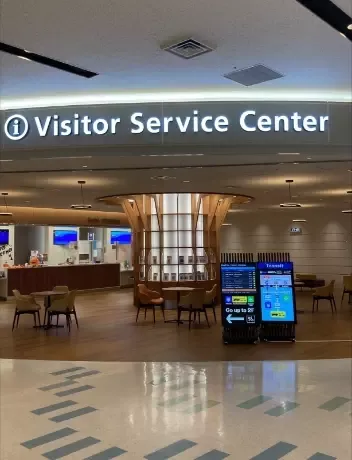
Tourist Information Centers
At “The Gateway to the Sky”, Naha Airport Arrival Lobby, and “The Gateway to the Land”, Yui rail Asahibashi Station/Naha Bus Terminal, there are Tourist Information Centers . The Staff who speak not only Japanese but also English and Chinese among other languages are there to help and guide you during your visit to Okinawa. The visitor center offers a variety of services such as, sales of bus passes, discount tickets for tourist facilities, SIM cards, baggage delivery and regular sightseeing tour bus reservations. As payment methods, Cash, credit cards (Touch payment), and QR cord payment (Alipay, WeChat Pay, Union Pay) are accepted. The Tourist Information Centers also provide Okinawa tourist maps and brochures. So feel free to drop by.

Dietary Requirements
Okinawa has a rich and diverse food culture with options to accommodate all visitors. There are a growing number of vegetarian restaurants and Halal-, vegetarian-, and vegan-friendly options across the islands. Some chain restaurants may display allergen information on their menus, but in most cases you will need to check directly with restaurant staff. Restaurants are increasingly able to cater to special dietary requirements, but in some cases may require advance reservations and notice. The materials below feature a point-to-communicate allergen chart and information on Halal and vegetarian options in Okinawa. For more information or help finding suitable dining options, visit the Barrier-Free OKINAWA website.
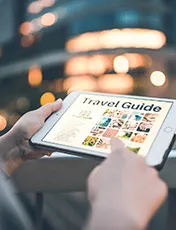
Useful Apps
There are many handy apps available to make traveling in Japan and Okinawa easy. Browse the Japan National Tourism Organization’s list to discover navigation, sightseeing, and accommodation apps among others.
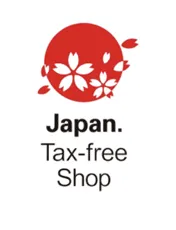
Tax-Free Shopping
Visitors to Okinawa are eligible for tax exemption on many consumer goods. Most major retail outlets offer tax-free shopping and have service counters where you can get more information on eligibility and procedures. The Japan Shopping website has a database of tax-free shops across the islands.
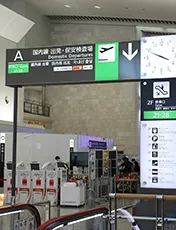
Duty-Free Shopping
International travelers to Okinawa can purchase goods without having to pay duty at DFS inside the departures lounge at Naha Airport and at T Galleria Okinawa in downtown Naha. More information is available on the DFS / T GALLERIA website.

Prohibited & Restricted Items
Certain items cannot be brought into Japan or are restricted and subject to inspections. There are also regulations on certain items being transported within Okinawa or taken outside of Okinawa. These regulations mainly apply to animal products, produce, and plants and seedlings. Popular fruits and vegetables such as mangoes, papayas, goya (bitter gourd), and watermelons are not restricted.
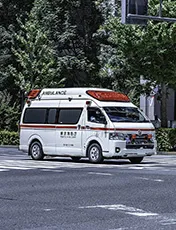
Emergency Services
In the event of an emergency, call the appropriate emergency service and do not worry about communication. All emergency calls are recorded and can be traced.
#110—Call the police to report an accident or crime. #119—Call an ambulance or fire engine in case of a medical emergency or fire. #118—Call the coast guard to report an accident or injury in the sea.
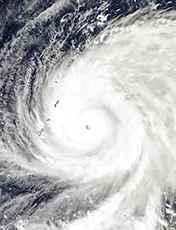
Typhoons are tropical cyclones and cause heavy rain, strong winds, and large waves. They typically affect Okinawa between June and September. It is important to check the weather before and during your trip, and to avoid going out during a typhoon.

Earthquakes
Japan is a country prone to natural disasters including earthquakes and tsunamis. In the event of an earthquake, the most important thing is to stay calm, find a safe space, and crouch with your arms above your head to protect from falling objects. Once the earthquake subsides, check the latest disaster prevention information to see if there is a risk of a tsunami. If a tsunami warning is issued, make your way to high ground immediately. There are several apps and online resources that provide information on what to do in the event of a natural disaster.
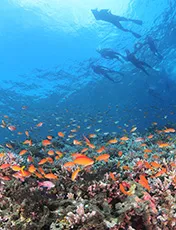
Enjoying Okinawa Safely
Okinawa has beautiful reefs, inviting waters, lush forests, and plenty of sunshine. The nature and the climate are markedly different from the mainland, and visitors should take extra care to avoid sunburn, heat stroke, and encounters with venomous animals.
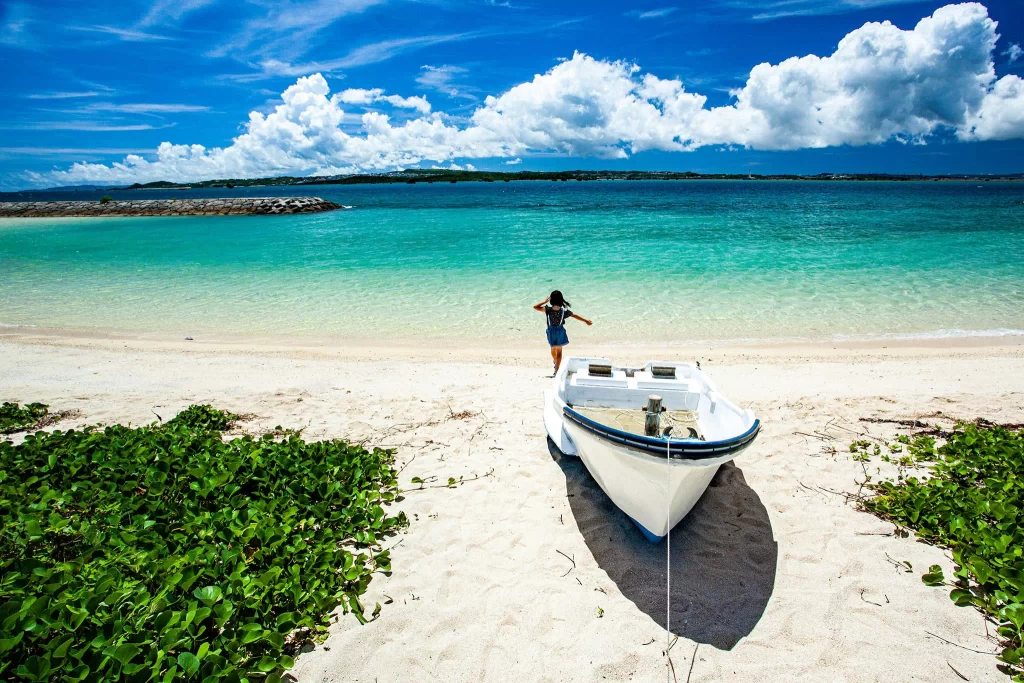
EXPLORE MORE OF OKINAWA
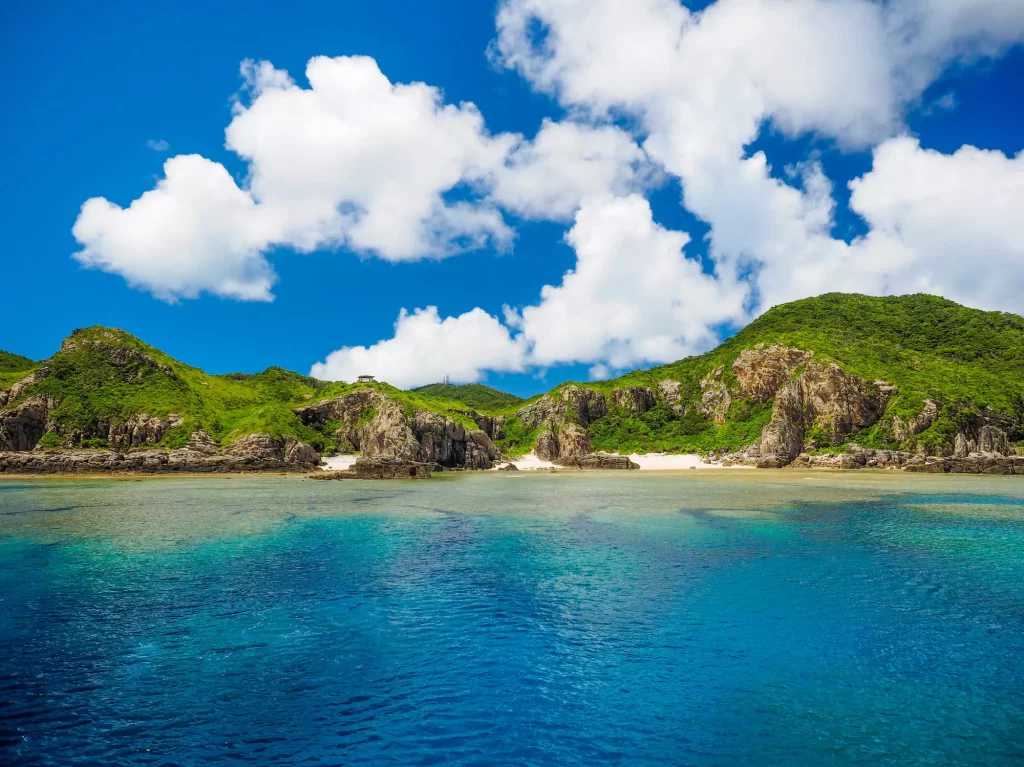
- Plan Your Trip
- Skip to main content
- Skip to "About this site"
Language selection
Search travel.gc.ca.
Help us to improve our website. Take our survey !
COVID-19: travel health notice for all travellers
Japan travel advice
Latest updates: The Need help? section was updated.
Last updated: April 26, 2024 07:13 ET
On this page
Safety and security, entry and exit requirements, laws and culture, natural disasters and climate, japan - take normal security precautions.
Take normal security precautions in Japan.
Back to top
Fukushima nuclear power plant and surrounding area
Following the 2011 incident at the Fukushima Daiichi nuclear power plant, Japanese authorities have placed restrictions, including travel and overnight stay bans, on the plant's surrounding area due to the risk of exposure to radiation. Restricted areas are clearly identified.
Follow the instructions of local authorities.
Assistance of Residents Affected by the Nuclear Incidents – Japanese Ministry of Economy, Trade and Industry
Tensions on Korean Peninsula
The regional security situation on the neighbouring Korean Peninsula could deteriorate suddenly. Tensions may increase before, during and after North Korean nuclear and missile tests. Military exercises and activities may also escalate tension.
- Remain vigilant
- Monitor developments to stay informed on the current situation
- Follow the instructions of local authorities, including the Cabinet Secretariat's guidance on civil protection
Cabinet Secretariat Civil Protection Portal
Crime against foreigners is generally low. However, petty crime, such as pickpocketing and purse snatching, occurs from time to time. Be cautious in entertainment and nightlife districts throughout Japan, especially in these four in Tokyo:
If you are the victim of a crime, file a police report at the closest station of the incident. Occasionally, local police may be hesitant to prepare a report for foreigners. If this happens, contact the Embassy of Canada to Japan for assistance.
Drug trafficking
An increasing number of travellers report having been used as unwitting drug couriers.
Penalties for drug-related criminal activities are severe. Even unsuspecting individuals transporting packages containing narcotics can be criminally charged and face long jail sentences.
Be wary of individuals, even those you know, who ask you to carry a package to Japan on their behalf.
Useful links
Drugs, alcohol and travel
- International Drug Smuggling Scams
Spiked food and drinks
Never leave food or drinks unattended or in the care of strangers. Be wary of accepting snacks, beverages, gum or cigarettes from new acquaintances. These items may contain drugs that could put you at risk of sexual assault and robbery.
There are reports of incidents where staff, or other customers at bars and nightclubs, have mixed drugs and copious amounts of alcohol into drinks of unsuspecting clients. These incidents are particularly frequent in the districts of Kabukicho and Roppongi in Tokyo. The intend is usually to defraud, overcharge services, rob or assault the person.
Credit card and ATM fraud occurs. There have been incidents of overcharging at bars and clubs. Disputes over overcharging have led to violence.
Be cautious when using debit or credit cards:
- pay careful attention when your cards are being handled by others
- use ATMs located in well-lit public areas or inside a bank or business
- avoid using card readers with an irregular or unusual feature
- cover the keypad with one hand when entering your PIN
- check for any unauthorized transactions on your account statements and contact your financial institution as soon as possible if irregularities
Overseas fraud
Women's safety
Women travelling alone may be subject to some forms of harassment and verbal abuse. Inappropriate physical contact may occur on busy subways and trains. There are women-only train cars during rush hour on some subway and train lines.
Advice for women travellers
Road safety
Road conditions and road safety are generally good throughout the country. However, roads may be narrow.
Japan Road Traffic Information Center (in Japanese)
Public transportation
Taxis are generally safe.
- Use only officially marked taxis
- Negotiate fares in advance, or insist that the driver use the meter, as you may be overcharged
- Have your destination written in Japanese as drivers may not understand English
Taxis in Japan – Japan National Tourism Organization
Train and subway
Travel by subway and train is quick and convenient. Signs are usually in Japanese but signage in English is becoming more common, especially in larger cities and at tourist destinations.
General safety information
Emergency information and advice for tourists is available from the Japan National Tourism Organization .
We do not make assessments on the compliance of foreign domestic airlines with international safety standards.
Information about foreign domestic airlines
Every country or territory decides who can enter or exit through its borders. The Government of Canada cannot intervene on your behalf if you do not meet your destination’s entry or exit requirements.
We have obtained the information on this page from the Japanese authorities. It can, however, change at any time.
Verify this information with the Foreign Representatives in Canada .
Entry requirements vary depending on the type of passport you use for travel.
Before you travel, check with your transportation company about passport requirements. Its rules on passport validity may be more stringent than the country’s entry rules.
Regular Canadian passport
Your passport must be valid for the expected duration of your stay in Japan. If you plan to travel to other countries in the region, check passport validity requirements for the countries you plan to visit.
Passport for official travel
Different entry rules may apply.
Official travel
Passport with “X” gender identifier
While the Government of Canada issues passports with an “X” gender identifier, it cannot guarantee your entry or transit through other countries. You might face entry restrictions in countries that do not recognize the “X” gender identifier. Before you leave, check with the closest foreign representative for your destination.
Other travel documents
Different entry rules may apply when travelling with a temporary passport or an emergency travel document. Before you leave, check with the closest foreign representative for your destination.
- Foreign Representatives in Canada
- Canadian passports
Tourist visa: not required for stays up to a maximum of 90 days Business visa: required Work visa: required Student visa: required
You can’t apply for a business, work or student visa if you have already entered Japan as a tourist.
Business travellers need a visa if they are to receive compensation in addition to their regular salary for work carried out while in Japan.
Overstaying the 90-day, tourist visa-free limit or any other visa time limit is a criminal offence. If you overstay, you may be subject to fines and deportation, and you may be barred from re-entry to Japan.
Other entry requirements
Customs officials may ask you to show them a return or onward ticket, confirmed accommodations arrangements and proof of sufficient funds to cover your stay.
Japanese officials will photograph and fingerprint visitors upon arrival. Exceptions may apply.
Immigration Services Agency of Japan
Registration
Japanese regulations require that visiting foreigners give detailed information when checking in at hotels or other lodging facilities.
Foreigners must also allow their passports to be photocopied.
Children and travel
Learn more about travelling with children .
Yellow fever
Learn about potential entry requirements related to yellow fever (vaccines section).
Relevant Travel Health Notices
- Global Measles Notice - 13 March, 2024
- COVID-19 and International Travel - 13 March, 2024
This section contains information on possible health risks and restrictions regularly found or ongoing in the destination. Follow this advice to lower your risk of becoming ill while travelling. Not all risks are listed below.
Consult a health care professional or visit a travel health clinic preferably 6 weeks before you travel to get personalized health advice and recommendations.
Routine vaccines
Be sure that your routine vaccinations , as per your province or territory , are up-to-date before travelling, regardless of your destination.
Some of these vaccinations include measles-mumps-rubella (MMR), diphtheria, tetanus, pertussis, polio, varicella (chickenpox), influenza and others.
Pre-travel vaccines and medications
You may be at risk for preventable diseases while travelling in this destination. Talk to a travel health professional about which medications or vaccines may be right for you, based on your destination and itinerary.
Yellow fever is a disease caused by a flavivirus from the bite of an infected mosquito.
Travellers get vaccinated either because it is required to enter a country or because it is recommended for their protection.
- There is no risk of yellow fever in this country.
Country Entry Requirement*
- Proof of vaccination is not required to enter this country.
Recommendation
- Vaccination is not recommended.
* It is important to note that country entry requirements may not reflect your risk of yellow fever at your destination. It is recommended that you contact the nearest diplomatic or consular office of the destination(s) you will be visiting to verify any additional entry requirements.
About Yellow Fever
Yellow Fever Vaccination Centres in Canada
Tick-borne encephalitis (TBE) is a risk in some areas of this destination. It is a viral disease that affects the central nervous system (brain and spinal cord). It is spread to humans by the bite of infected ticks or occasionally when unpasteurized milk products are consumed.
Travellers to areas where TBE is found may be at higher risk during April to November, and the risk is highest for people who hike or camp in forested areas.
Protect yourself from tick bites . The vaccine is not available in Canada. It may be available in the destination you are travelling to.
In this destination, rabies may be present in some wildlife species, including bats. Rabies is a deadly disease that spreads to humans primarily through bites or scratches from an infected animal.
If you are bitten or scratched by an animal while travelling, immediately wash the wound with soap and clean water and see a health care professional.
Before travel, discuss rabies vaccination with a health care professional. It may be recommended for travellers who will be working directly with wildlife.
Measles is a highly contagious viral disease. It can spread quickly from person to person by direct contact and through droplets in the air.
Anyone who is not protected against measles is at risk of being infected with it when travelling internationally.
Regardless of where you are going, talk to a health care professional before travelling to make sure you are fully protected against measles.
Japanese encephalitis is a viral infection that can cause swelling of the brain. It is spread to humans through the bite of an infected mosquito. Risk is very low for most travellers. Travellers at relatively higher risk may want to consider vaccination for JE prior to travelling.
Travellers are at higher risk if they will be:
- travelling long term (e.g. more than 30 days)
- making multiple trips to endemic areas
- staying for extended periods in rural areas
- visiting an area suffering a JE outbreak
- engaging in activities involving high contact with mosquitos (e.g., entomologists)
Hepatitis B is a risk in every destination. It is a viral liver disease that is easily transmitted from one person to another through exposure to blood and body fluids containing the hepatitis B virus. Travellers who may be exposed to blood or other bodily fluids (e.g., through sexual contact, medical treatment, sharing needles, tattooing, acupuncture or occupational exposure) are at higher risk of getting hepatitis B.
Hepatitis B vaccination is recommended for all travellers. Prevent hepatitis B infection by practicing safe sex, only using new and sterile drug equipment, and only getting tattoos and piercings in settings that follow public health regulations and standards.
Coronavirus disease (COVID-19) is an infectious viral disease. It can spread from person to person by direct contact and through droplets in the air.
It is recommended that all eligible travellers complete a COVID-19 vaccine series along with any additional recommended doses in Canada before travelling. Evidence shows that vaccines are very effective at preventing severe illness, hospitalization and death from COVID-19. While vaccination provides better protection against serious illness, you may still be at risk of infection from the virus that causes COVID-19. Anyone who has not completed a vaccine series is at increased risk of being infected with the virus that causes COVID-19 and is at greater risk for severe disease when travelling internationally.
Before travelling, verify your destination’s COVID-19 vaccination entry/exit requirements. Regardless of where you are going, talk to a health care professional before travelling to make sure you are adequately protected against COVID-19.
The best way to protect yourself from seasonal influenza (flu) is to get vaccinated every year. Get the flu shot at least 2 weeks before travelling.
The flu occurs worldwide.
- In the Northern Hemisphere, the flu season usually runs from November to April.
- In the Southern Hemisphere, the flu season usually runs between April and October.
- In the tropics, there is flu activity year round.
The flu vaccine available in one hemisphere may only offer partial protection against the flu in the other hemisphere.
The flu virus spreads from person to person when they cough or sneeze or by touching objects and surfaces that have been contaminated with the virus. Clean your hands often and wear a mask if you have a fever or respiratory symptoms.
Safe food and water precautions
Many illnesses can be caused by eating food or drinking beverages contaminated by bacteria, parasites, toxins, or viruses, or by swimming or bathing in contaminated water.
- Learn more about food and water precautions to take to avoid getting sick by visiting our eat and drink safely abroad page. Remember: Boil it, cook it, peel it, or leave it!
- Avoid getting water into your eyes, mouth or nose when swimming or participating in activities in freshwater (streams, canals, lakes), particularly after flooding or heavy rain. Water may look clean but could still be polluted or contaminated.
- Avoid inhaling or swallowing water while bathing, showering, or swimming in pools or hot tubs.
Typhoid is a bacterial infection spread by contaminated food or water. Risk is higher among children, travellers going to rural areas, travellers visiting friends and relatives or those travelling for a long period of time.
Travellers visiting regions with a risk of typhoid, especially those exposed to places with poor sanitation, should speak to a health care professional about vaccination.
Insect bite prevention
Many diseases are spread by the bites of infected insects such as mosquitoes, ticks, fleas or flies. When travelling to areas where infected insects may be present:
- Use insect repellent (bug spray) on exposed skin
- Cover up with light-coloured, loose clothes made of tightly woven materials such as nylon or polyester
- Minimize exposure to insects
- Use mosquito netting when sleeping outdoors or in buildings that are not fully enclosed
To learn more about how you can reduce your risk of infection and disease caused by bites, both at home and abroad, visit our insect bite prevention page.
Find out what types of insects are present where you’re travelling, when they’re most active, and the symptoms of the diseases they spread.
There is a risk of chikungunya in this country. The risk may vary between regions of a country. Chikungunya is a virus spread through the bite of an infected mosquito. Chikungunya can cause a viral disease that typically causes fever and pain in the joints. In some cases, the joint pain can be severe and last for months or years.
Protect yourself from mosquito bites at all times. There is no vaccine available for chikungunya.
- In this country, risk of dengue is sporadic. It is a viral disease spread to humans by mosquito bites.
- Dengue can cause flu-like symptoms. In some cases, it can lead to severe dengue, which can be fatal.
- The level of risk of dengue changes seasonally, and varies from year to year. The level of risk also varies between regions in a country and can depend on the elevation in the region.
- Mosquitoes carrying dengue typically bite during the daytime, particularly around sunrise and sunset.
- Protect yourself from mosquito bites . There is no vaccine or medication that protects against dengue fever.
Animal precautions
Some infections, such as rabies and influenza, can be shared between humans and animals. Certain types of activities may increase your chance of contact with animals, such as travelling in rural or forested areas, camping, hiking, and visiting wet markets (places where live animals are slaughtered and sold) or caves.
Travellers are cautioned to avoid contact with animals, including dogs, livestock (pigs, cows), monkeys, snakes, rodents, birds, and bats, and to avoid eating undercooked wild game.
Closely supervise children, as they are more likely to come in contact with animals.
Person-to-person infections
Stay home if you’re sick and practise proper cough and sneeze etiquette , which includes coughing or sneezing into a tissue or the bend of your arm, not your hand. Reduce your risk of colds, the flu and other illnesses by:
- washing your hands often
- avoiding or limiting the amount of time spent in closed spaces, crowded places, or at large-scale events (concerts, sporting events, rallies)
- avoiding close physical contact with people who may be showing symptoms of illness
Sexually transmitted infections (STIs) , HIV , and mpox are spread through blood and bodily fluids; use condoms, practise safe sex, and limit your number of sexual partners. Check with your local public health authority pre-travel to determine your eligibility for mpox vaccine.
Medical services and facilities
Health care is very good. Service is available throughout the country.
Services in English could be limited, especially in rural areas. The cost of health-care services is similar to Canada. As a foreigner, you will likely have to pay in advance or provide a document proving that the bill will be paid prior to discharge.
Make sure you get travel insurance that includes coverage for medical evacuation and hospital stays.
Travel health and safety
Health insurance for foreign workers
As a Canadian working in Japan, you must have medical and health services coverage for the duration of your stay. If not provided by your Japanese employer, you must subscribe to the national health insurance plan.
If you need to consult medical professionals, the following organizations can refer you to medical facilities with English and other foreign language-speaking staff:
- Japan National Tourism Organization
- Tokyo Metropolitan Health and Medical Information Centre (in Japanese)
- AMDA International Medical Information Center
Keep in Mind...
The decision to travel is the sole responsibility of the traveller. The traveller is also responsible for his or her own personal safety.
Be prepared. Do not expect medical services to be the same as in Canada. Pack a travel health kit , especially if you will be travelling away from major city centres.
You must abide by local laws.
In many cases, arrested or detained suspects are denied oral or written communication with anyone other than their lawyer or a Canadian consular representative for an extended period.
If you are detained, even for a minor offence, you may be held without charge for up to 23 days. Police officers may begin their initial questioning before you see a lawyer. You could also be in detention for weeks or months during the investigation and legal proceedings.
- Overview of the criminal law system in Japan
- Arrest and detention
Penalties for possession, use or trafficking of illegal drugs are severe. Convicted offenders can expect jail sentences and heavy fines. Japan has a zero-tolerance policy with respect to drugs, including recreational drugs and cannabis. Severe penalties are imposed for the possession of even a small quantity.
Medications
Certain medications are banned in Japan, including:
- amphetamines
- methamphetamines
- pseudoephedrine
You may bring a one-month supply of prescription medication or a two-month supply of non-prescription medication into Japan, as long as the medication does not contain narcotics (including codeine). You cannot bring banned substances with you, even with a prescription.
You must have a doctor’s note that states your full name, address, the reason for use, and dosage, along with your prescribed medication. Local authorities may also request a detailed listing of the contents of the medication.
If you wish to bring in larger supplies of medication or bring in prescription medication that contains narcotics, you must apply in advance for import certification. You should do so several months prior to arrival.
Bringing medicines for personal use into Japan – Japanese Ministry of Health, Labour and Welfare
2SLGBTQI+ travellers
Japanese law doesn't prohibit sexual acts between individuals of the same sex. However, homosexuality is not widely socially accepted.
Travel and your sexual orientation, gender identity, gender expression and sex characteristics
Dual citizenship
Dual citizenship is not legally recognized in Japan.
If local authorities consider you a citizen of Japan, they may refuse to grant you access to Canadian consular services. This will prevent us from providing you with those services.
Travellers with dual citizenship
If you acquire 2 or more citizenships at birth, you can keep them all, including Japanese citizenship, until the age of 18. At 18, you must choose between your Japanese citizenship or other citizenships within a 2-year period.
Japanese family law is different from Canadian family law.
In Japan, joint custody of a child after separation is not a legal option if one of the parents is a Japanese national. As a result, access rights for a non-custodial parent can be limited, if granted.
If you are involved in a custody or other family law dispute in Japan, consult a Japanese family lawyer.
International Child Abduction
The Hague Convention on the Civil Aspects of International Child Abduction is an international treaty. It can help parents with the return of children who have been removed to or retained in certain countries in violation of custody rights. The convention applies between Canada and Japan.
If your child was wrongfully taken to, or is being held in Japan, and if the applicable conditions are met, you may apply for the return of your child to the Japanese court.
If you are in this situation:
- act as quickly as you can
- contact the Central Authority for your province or territory of residence for information on starting an application under The Hague Convention
- consult a lawyer in Canada and in Japan to explore all the legal options for the return of your child
- report the situation to the nearest Canadian government office abroad or to the Vulnerable Children’s Consular Unit at Global Affairs Canada by calling the Emergency Watch and Response Centre
If your child was removed from a country other than Canada, consult a lawyer to determine if The Hague Convention applies.
Be aware that Canadian consular officials cannot interfere in private legal matters or in another country’s judicial affairs.
- List of Canadian Central Authorities for the Hague Convention
- International Child Abduction: A Guidebook for Left-Behind Parents
- Travelling with children
- The Hague Convention - Hague Conference on Private International Law
- Canadian embassies and consulates by destination
- Emergency Watch and Response Centre
Identification
You must carry your passport or residence card at all times.
A photocopy will not satisfy authorities. Police officers in Japan may ask for your identification documents at any time.
If you fail to do so, you could face arrest or detention.
Working in Japan
Working without an appropriate visa is illegal. Offenders may be subject to imprisonment, a fine and deportation.
If you are considering employment offers in Japan, contact the Japanese embassy or consulate nearest you before coming to Japan.
Foreign diplomatic missions and consulates in Canada
Teaching English
You should carefully review a contract to teach English before you sign. There have been incidents of employers not adhering to their contractual obligations.
Ensure that all terms and conditions of employment are clearly stated in the contract and that you meet all requirements before accepting an offer.
More on teaching English in Japan
You may be denied entry to public establishments such as swimming pools, hot springs, beaches and some gyms if you have a tattoo.
Some establishments may ask that you cover your tattoo.
Traffic drives on the left.
You must carry an international driving permit along with your Canadian licence, or a Japanese driver’s licence.
International Driving Permit
You must also obtain Japanese insurance. There are two types of driving insurance available:
- compulsory insurance, which is basic government-mandated insurance covering your legal liability
- voluntary insurance, obtained on your own from a private company and designed for your needs
Should you have an accident, compulsory insurance may not be sufficient.
Drinking and driving
Penalties for drinking and driving are severe.
Under Japanese law, it’s forbidden to:
- drive if you have been drinking
- lend a car to someone who has been drinking
- serve alcohol to someone who has to drive
If you are a passenger in a car whose driver is under the influence of alcohol, you both are subject to prosecution.
The currency of Japan is the yen (JPY).
Credit cards are accepted in most major hotels and restaurants, but Japan is a predominantly cash-based society.
ATMs are widely available, but many don’t accept foreign debit cards.
Typhoons usually occur between June and October. During this period, even small storms can quickly develop into major typhoons. Southern areas, including Okinawa and surrounding islands, are more vulnerable.
These severe storms can put you at risk and hamper the provision of essential services.
If you decide to travel to Japan during the typhoon season:
- know that you expose yourself to serious safety risks
- be prepared to change your travel plans on short notice, including cutting short or cancelling your trip
- stay informed of the latest regional weather forecasts
- carry emergency contact information for your airline or tour operator
- follow the advice and instructions of local authorities
- Tornadoes, cyclones, hurricanes, typhoons and monsoons
- Large-scale emergencies abroad
- Japan Meteorological Agency
Seismic activity
Japan is located in an active seismic zone and is prone to a multitude of natural disasters such as earthquakes, tsunamis, flooding, volcanic eruptions. Strong earthquakes occur, as well as tsunamis.
Earthquakes
Each year, Japan experiences thousands of earthquakes of varying magnitudes, some triggering tsunamis. Deaths, injuries and significant damage may occur.
Earthquakes - Government of Canada
Japan is prone to tsunamis. A tsunami can occur within minutes of a nearby earthquake. However, the risk of tsunami can remain for several hours following the first tremor. If you’re staying on the coast, familiarize yourself with the region’s evacuation plans in the event of a tsunami warning.
Tsunami alerts - U.S. Tsunami Warning System
There are a number of active volcanoes. The Japan Meteorological Agency lists active volcanoes and associated warnings.
If you are travelling near a volcano, check for the latest activity and warnings. Always follow the advice and instructions of local authorities.
Volcanic alert levels and warnings - Japan Meteorological Agency
Seasonal risks
Snowstorms occur in western Honshu and Hokkaido from December to March.
Avalanches can occur in mountainous areas, including at ski resorts. These can cause power disruptions, make roads impassable and limit the ability of responders to reach these areas in case of emergency.
- Information in case of natural disasters - Japan National Tourism Organization
Local services
In case of emergency, dial:
- police: 110
- medical assistance: 119
- firefighters: 119
Consular assistance
For emergency consular assistance, call the Embassy of Canada to Japan, in Tokyo, and follow the instructions. At any time, you may also contact the Emergency Watch and Response Centre in Ottawa.
When calling from within Japan, the area code is preceded by a 0. There is no 0 when calling from outside Japan. If placing a call to a cellular phone number, you do not need to enter the code.
The decision to travel is your choice and you are responsible for your personal safety abroad. We take the safety and security of Canadians abroad very seriously and provide credible and timely information in our Travel Advice to enable you to make well-informed decisions regarding your travel abroad.
The content on this page is provided for information only. While we make every effort to give you correct information, it is provided on an "as is" basis without warranty of any kind, expressed or implied. The Government of Canada does not assume responsibility and will not be liable for any damages in connection to the information provided.
If you need consular assistance while abroad, we will make every effort to help you. However, there may be constraints that will limit the ability of the Government of Canada to provide services.
Learn more about consular services .
Risk Levels
take normal security precautions.
Take similar precautions to those you would take in Canada.
Exercise a high degree of caution
There are certain safety and security concerns or the situation could change quickly. Be very cautious at all times, monitor local media and follow the instructions of local authorities.
IMPORTANT: The two levels below are official Government of Canada Travel Advisories and are issued when the safety and security of Canadians travelling or living in the country or region may be at risk.
Avoid non-essential travel
Your safety and security could be at risk. You should think about your need to travel to this country, territory or region based on family or business requirements, knowledge of or familiarity with the region, and other factors. If you are already there, think about whether you really need to be there. If you do not need to be there, you should think about leaving.
Avoid all travel
You should not travel to this country, territory or region. Your personal safety and security are at great risk. If you are already there, you should think about leaving if it is safe to do so.
- Meetings & Events
- Newsletter Sign-up
- Coronavirus (COVID-19) Advisory Information
- Select Language 简体中文 繁體中文(香港) 繁體中文(臺灣) India (English) Bahasa Indonesia 한국어 ภาษาไทย Tiếng Việt Singapore (English) Philippines (English) Malaysia (English) Australia/New Zealand (English) Français Deutsch Italiano Español United Kingdom (English) Nordic countries(English) Canada (English) Canada (Français) United States (English) Mexico (español) Português العربية Japan(日本語) Global (English)
- India (English)
- Bahasa Indonesia
- Singapore (English)
- Philippines (English)
- Malaysia (English)
- Australia/New Zealand (English)
- United Kingdom (English)
- Nordic countries(English)
- Canada (English)
- Canada (Français)
- United States (English)
- Mexico (español)
- Global (English)
- Fujiyoshida
- Shimonoseki
- Ishigaki Island
- Miyako Island
- Kerama Island
- Tokyo Island
- Koka & Shigaraki
- Hida Takayama
- Ginza, Nihonbashi
- Beppu & Yufuin (Onsen)
- Ginzan Onsen
- Nagasaki Islands

- Kumano Kodo
- Shikoku Karst
- Amami Oshima
- Hachimantai
- Omihachiman
- Aizuwakamatsu

- Diving in Japan
- Skiing in Japan
- Seasonal Flowers in Japan
- Sustainable Outdoors
- Off the Beaten Track in Japan
- Scenic Spots
- World Heritage
- Home Stays & Farm Stays

- Japanese Gardens
- Japanese Crafts
- Temple Stays
- Heritage Stays
- Festivals and Events
- Theater in Japan
- Japanese Tea Ceremony
- Cultural Experiences in Japan
- Culture in Japan

- Local Cuisine Eastern Japan
- Local Cuisine Western Japan
- Local Street Food
- Japan's Local Ekiben
- Japanese Whisky
- Vegetarian and Vegan Guide
- Sushi in Japan Guide
- Japanese Sake Breweries

- Art Museums
- Architecture
- Performing Arts
- Art Festivals
- Japanese Anime and Comics
- Japanese Ceramics
- Local Crafts

- Scenic Night Views
- Natural Wonders
- Theme Parks
- Samurai & Ninja
- Iconic Architecture

- Wellness Travel in Japan
- Japanese Ryokan Guide
- A Guide to Stargazing in Japan
- Relaxation in Japan
- Forest Bathing (Shinrin-yoku)

- Experiences in Japan
- Enjoy my Japan
- National Parks
- Japan's Local Treasures
- Japan Heritage
- Snow Like No Other
- Wonder Around Japan

- Visa Information
- Getting to Japan
- Airport Access
- COVID-19: Practical Information for Traveling to Japan
- Anime Tourism
- Countryside Stays
- Accessible Tourism
- Hokkaido Great Outdoors
- Scenic World Heritage in Tohoku
- Shikoku’s Nature and Traditions
- Southern Kyushu by Rail

- Traveling by Rail
- How to Travel by Train and Bus
- JR Rail Passes
- Scenic Railways
- Renting a Car
- Sustainable Travel in Japan
- Travel Brochures
- Useful Apps
- Online Reservation Sites
- Eco-friendly Accommodation
- Luxury Accommodations
- Traveling With a Disability
- Hands-free Travel
- How to Book a Certified Tour Guide
- Volunteer Guides
- Tourist Information Center

- Japanese Manners
- Spring in Japan
- Summer in Japan
- Autumn in Japan
- Winter in Japan
- Cherry Blossom Forecast
- Autumn Leaves Forecast

- Japan Visitor Hotline
- Travel Insurance in Japan
- Japan Safe Travel Information
- Accessibility in Japan
- Vegetarian Guide
- Muslim Travelers
- Safety Tips

- News from JNTO
- US Partner News
- Interesting Articles
- Press Release
- Newsletter Archives
- Trade Newsletter
- Tender Notice
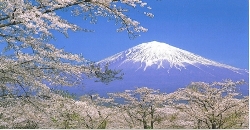
My Favorites
${v.desc | trunc(25)}
Planning a Trip to Japan?
Share your travel photos with us by hashtagging your images with #visitjapanjp
【Notice of Proposal Competition】Co-Op Marketing Project with Tour Operators and Travel Agencies for the U.S. Market in FY2024
The objective of this project is to improve the reservation rate of travel products for Japan by conducting a co-op marketing project with tour operators and travel agencies handling inbound travel products to Japan in the United States.
Period of delivery of the Request For Proposals:From April 23, 2024 until 5pm, May 28, 2024 (must be received by Eastern Daylight Time)
Deadline of submission of proposal:By 5pm, May 28, 2024 (Eastern Daylight Time)
The Request For Proposals will be delivered by hand or via e-mail. If delivery of the Request For Proposals is desired, please contact [email protected] in advance.
Please see details below.
▼Notice of Proposal Competition
- Previous Article
- Back to Overview
Please Choose Your Language
Browse the JNTO site in one of multiple languages

IMAGES
VIDEO
COMMENTS
The official site of Japan National Tourism Organization is your ultimate Japan guide with tourist information for Tokyo, Kyoto, Osaka, Hiroshima, Hokkaido and other top Japan holiday destinations. We offer travel information to make your Japan travel more comfortable and enjoyable.
TOKIO OMOTENASHI POLICY is an Travel insurance policy in case of illness / injury for person visiting Japan for up to 31days that can be purchased online. ... Japan National Tourism Organization (JNTO) Non-payment of medical treatment by foreign travelers in Japan has become a problem, and the government has taken such measures.
Hokuriku Shinetsu. Niigata; Toyama; Ishikawa; Fukui; Nagano; Kanto
If you are subscribed to overseas travel insurance including cash-free payment service, there is no need for payment. However, if you are not subscribed to overseas travel insurance, you may be charged the full amount. ... The Japan National Tourism Organization (JNTO) operates a 24/7 multilingual call center service "Japan Visitor Hotline". ...
Travel Insurance: USA To Japan Trip. Erica Lamberg, Michelle Megna. Contributor, Lead Editor, Insurance. Updated: Jun 30, 2023, 2:48am. Editorial Note: We earn a commission from partner links on ...
In fact they even allow young children to be covered for free. If cancellation and delay is not a concern for you or if you will be spending some considerable time on your trip, then consider SafetyWing travel insurance. Emergency Accident & Sickness Medical Expenses - $250,000. Baggage and Personal Property - $3000.
The Japan National Tourism Organization (JNTO) will provide foreign tourists with necessary information during natural disasters and other emergencies through its "Japan Safe Travel (JST)" account." twitter account:@JapanSafeTravel weibo account:安心访日JapanSafeTravel NHK World-JAPAN【English support】 A 24-hour English channel that ...
As a rough guide, it can range from US$6.61 *. to US$52.86 *. for a one-week trip, depending on your age, place of residence, itinerary, and preferences. If you are under 40, a month-long travel medical insurance policy through SafetyWing will set you back approximately US$31.05 *. , or 42 USD.
Due to the spread of Covid-19, Japan restricted its number of visitors and only accepted tourists traveling in groups. However, restrictions were lifted in October 2022 for the first time in two and a half years! The number of foreign visitors to Japan, which has declined significantly, is expected to increase due to the depreciation of the yen. Even before the spread of Covid-19, the Japan ...
The Japan National Tourism Organization (国際観光振興機構, Kokusai Kankō Shinkō Kikō), JNTO, provides information about Japan to promote travel to and in the country. It was established in 1964 and its headquarters are in Yotsuya, Shinjuku-ku, Tokyo. [2] The JNTO operates Tourist Information Centers (TICs) as well as a website.
Top 5 FAQs. Can I bring my e-cigarette and vape liquid? Please send me maps/brochures. I understand that liquids cannot be brought onto the airplane, so how can I apply for tax exemption for cosmetics and so on? Do I need an International Driver's License to drive in Japan? Any restrictions on entering Japan?
It is recommended to take out travel insurance for your trip to Japan. Medical expenses can be high if you become sick or injured and need to visit a hospital while in Japan. It is important to check the policies including Covid-19 coverage. ... The Japan National Tourism Organization (JNTO) operates a traveler hotline all year round 24 hours a ...
Purchasing travel insurance that provides sufficient coverage and services can give you peace of mind in the event of an unexpected injury or illness during your trip. Hospital visits and emergency services can be very costly, so insurance is a wise precaution. ... Browse the Japan National Tourism Organization's list to discover navigation ...
As per the official website of Japan National Tourism Organization, all foreigners are strongly advised to buy travel insurance Japan to avoid any major financial burden because of emergencies. Since 2021, foreigners with unpaid medical costs may be restricted or refused entry to Japan.
The activities of the overseas JNTO offices include. 1) Promotion of Japanese tourism. 2) Operation of the Tourist Information Center in Japan for international visitors. 3) Administration of Guide-interpreter examinations. 4) Publication of tourism statistics and market reports. 5) Providing support for international conventions and incentive ...
Taxis in Japan - Japan National Tourism Organization. Train and subway. Travel by subway and train is quick and convenient. Signs are usually in Japanese but signage in English is becoming more common, especially in larger cities and at tourist destinations. General safety information. Emergency information and advice for tourists is ...
Japan National Tourism Organization (JNTO) operates a visitor hotline 24 hours a day, 365 days a year. Call for tourist information or assistance in the case of accidents and emergencies. Support is available in English, Chinese, Korean, and Japanese
Smooth your way with a little forward planning. It is easy to feel a little overwhelmed and disoriented when you visit Japan for the first time, so find out the basics before you fly and get acquainted with the country through our helping you plan guide. Learn a little more about Japan's customs, culture and Wi-Fi connectivity, as well as its ...
Located in the northwestern area of Kyoto, Arashiyama draws many visitors for its world-renowned bamboo grove and beautiful scenery that changes with each season. The area is dotted with temples, old imperial villas, and famous historical sites, many of which are National Treasures, or have been recognized as World Heritage sites.
JNTO - Japan National Tourism Organization Situated in the western portion of Japan, known as the Chugoku region, lies Shimane Prefecture. Facing the Sea of Japan, this hidden gem is filled to the brim with stunning sights to see and experiences to undertake.
JNTO - Japan National Tourism Organization Premiering earlier this month on 10th April, the 4th series of Race Across the World pits 5 pairs of adventurers against each other as they attempt to cross Asia, all without their phones, the internet, and other essentials.
JNTO - Japan National Tourism Organization The objective of this project is to improve the reservation rate of travel products for Japan by conducting a co-op marketing project with tour operators and travel agencies handling inbound travel products to Japan in the United States.